#look the day has arrived when i write meta on meta
Note
Hey!!
I recently saw someone claim that Wei Wuxian was starved of conversation on his journey to Yiling with Lan Wangji and Wen Ning and so board he needed to chat to people before they ascend the mountain. I hadn't really noticed this until it was mentioned. What do you think of that scene?
I love your meta and fics btw. You use your understanding of the novel in your writing and it's just *chef's kiss*
Hi anon 👋🏻
Personally, I've not seen any comments regarding the above - but we can certainly look at the text in question 😊
Let's take a look at the scene in question:
Several days later, they arrived in Yiling.
The Burial Mounds were less than five kilometers ahead of this small
town. Although they didn’t know exactly what awaited them there, Wei
Wuxian had a feeling it wasn’t anything good.
But Lan Wangji was right by his side, his gait steady, his gaze cool.
Wei Wuxian had never been one with any sense of crisis to begin with, and
with the way Lan Wangji looked, he was even less likely to get nervous at
all.
Passing through the small town of Yiling, he was awash in the sounds
of the local accent. It was invigorating and incomparably endearing. While
he wasn’t planning on buying anything, he couldn’t help but strike up
conversations in the local dialect with the street vendors. Only after he’d
had his fill of socializing did he get down to business.
“Hanguang-jun, you remember this town, right?”
7S translation
So the scene opens with WWX gushing over how safe and happy he feels around LWJ. He's just so thankful to have someone by his side, someone he can fully depend on and is there for him, should he need it. This very much echoes his thoughts from when they began their descent from the Cloud Recesses, at the start of their journey here. For someone nearing the place he met such a gruesome end at previously, he seems incredibly content and calm - all thanks to LWJ. So straight away, we are reminded of how WWX feels around the other man. It's there for a reason, to set the scene. WWX is relaxed and enjoying himself because he's with LWJ.
They have just arrived in a city he is very familiar with. It's the place he both lived as an orphan and frequented as a man while residing at the burial mounds. He is surrounded by the accent of his "home" for the first time in over 13 years and it's making him feel sentimental. I also think it's a great parallel between when WWX finally visits Lotus Pier in the coming chapters and how desolate and subdued the place has become since JC became sect leader.
I think the above reaction is very normal considering the emotional impact it obviously had on him. WWX has already stated on numerous occasions that LWJ makes him happy and he enjoys his company, but he's also very sociable and likes to look around markets and chat with vendors - there's even a scene in the novel which states as such and many other examples. Although WWX is running around chatting and exploring the stalls, LWJ is still by his side. Doing so does not subtract from his obvious enjoyment of having LWJ's unwavering presence.
We see more than enough evidence that WWX happily chats to LWJ and that he, in turn, even responds and asks questions also. There seems to be this mind-boggling misconception that LWJ literally doesn't speak, and if he does he's like some caveman that can't communicate effectively, when it's the exact opposite. LWJ talks when necessary and is very succinct with his words - he's a true gentleman of their time. Of course, in comparison to WWX, he's much less chatty - but when he does talk it's sincere and relevant. WWX loves this about him! He's also an incredible listener and doesn't miss a single thing WWX says, which WWX also appreciates! Hardly anyone listens to all his ramblings and holds them all so dearly!
It's funny, because although WWX chats to anyone and everyone, it's obvious he enjoys conversing with LWJ the most. He treasures the fact they are on the same wavelength and understand each other implicitly 🥰
Aww! Thank you so much anon! I'm glad you are enjoying my meta and fics ❤️
I hope I managed to answer your question! Have a lovely day 😘
59 notes
·
View notes
Note
I've been reading your ofmd meta. It's amazing! How did you learn to figure all that stuff out?
Thank you for the ask!
There are two distinct questions here:
What makes OFMD a compelling ground for media and critical (meta) analysis?
What’s the critical basis I’m using in writing meta analysis and how did I learn to use it the way I do?
Why Write Meta Analysis of “Our Flag Means Death”?
The first question is easy: THERE IS SO MUCH TO UNPACK HERE. It’s all right out in the open, too, and it’s a real credit to David Jenkins that he created a supportive environment for the cast, the creative directors, the writers, and his entire CREW to bring all of their creative selves.
OFMD is so full of love for its characters and story that it always takes my breath away whenever I think about it. So much creative energy and love was wrapped into this show in so many ways that I’ll never shut up about it ever.
The second question has a longer answer.
Analytical Training, Experience, and Practice (Not Necessarily In That Order)
While I am formally trained and have a BA in English, I would still credit my experience as a writer-practitioner as equally or more important in my analytical background as the formal training.
I am first and foremost a writer, and I “read” texts like a writer who wants to figure out what makes a narrative function. Learning how something is working is fundamental to being able to replicate it in your own artwork.
The simplest term for what I use as a framework for all my meta is a technique historically called close reading, but I’d openly admit that I am more flexible and informal with it than you’d find taught in a typical college class!
Think of a “reading” in literature or film/media analysis as a bit like what a study or practice sketch does for visual artists.
When I was writing my meta post on The Tragedy of Israel Hands, I very explicitly decided to tackle OFMD and what was happening with Izzy by breaking down the show into episode-by-episode readings from Izzy’s point of view.
I also chose to add some extra spice based on direct scene transcriptions, mentions of Izzy by-name even when he wasn’t on-screen, and what was happening for him as a character (what was his story?) vs. the obvious romance that was happening for Edward and Stede in the foreground.
David Jenkins had helpfully stated in an interview that OFMD was broken up into acts, so I just followed his lead on doing the same in my analysis. ;) He’d also suggested doing a rewatch with a focus on Con O’Neill and I was intrigued by the possibility of what I might find.
Turned out? Con managed to fit an actual three-act tragedy into the same visual and narrative space (albeit in the background) as Rhys and Taika acting the main romance in the foreground! This is fucking incredible in my opinion. Con’s narrative counterpoint with Izzy adds so much depth and richness to the romance and the comedy. I could chew glass over it (and I did! hence the post).
I firmly believe that ANYONE can do a good and detailed textual reading (with or without formal training), so here’s my quick(?) breakdown of how that works for me in the hope that it will inspire you and others to try your hand!
The best way to get good at analysis is to practice. Analyze, analyze, analyze! Write, write, write! Create in whatever way makes sense to your brain and energizes you to explore how you think about what you love. You don’t even have to publish/share the results. It can just be for you if you want.
As usual, only do what works for you.
If there’s a thought or a step that you want to skip? Skip it. Do what you want. Create and write meta! Enrich the OFMD fandom with your own readings. :D
Ferus-Style Close Reading Guide
Goal: Break things down to build a detailed, text-supported understanding of a creative product (story, episode, play, film, painting, etc.). You can do this whenever you’re interested in something and feel like spending more time with it as a method of learning more and deeply appreciating a work of art.
Pick a moment in the text (show, fanfic, story, etc.) that interests you.
Interest is crucial! Think about why you’re interested. Sit with the text a bit.
Take extensive notes on what’s happening. You can also use another method you prefer like outlining, grabbing screencaps, or some combination to record and organize your first impressions and thoughts.
This serves as a record of where you started.
Don’t necessarily try to interpret right away, but DO decide for yourself what you think is happening in a moment or a particular scene. This can be as short as a single line of text or a few seconds of interaction in a TV episode or film. Trust yourself! The best art, by and large, does what it does in plain sight and will repeat or reinforce the significant themes and symbols.
Hold off on interpretation to allow yourself time to develop a good understanding of what has actually taken place in the text. Plenty of professional critics are weak at this step and jump straight into reshaping events to fit their thesis and interpretation rather than reading “out of” a text. It’s not necessarily bad (and there are techniques that use this sort of interpretation), but it’s really not where I’m coming from.
Break down your favorite scenes into as many moments (or points of focus) as are likely to be relevant to your analysis. If you’re working with a specific character, focus on their actions or their scenes (or other ‘by name’ references when they’re not on-screen). If the focus is a motif (a visual element), try to figure out what its appearance or framing is accomplishing when it is present. How do other characters react to it or introduce it? How do these interactions “read” to you? Again, what is happening?
This is the focusing step that typically tells me where the rest of my analysis is going. At this point I usually have an idea of what I’m seeing when it’s either reinforced by one or more sequential scenes (reinforced) or dropped and sidelined in an interesting way.
Take a step back and think about how the moment you’re analyzing is ‘working.’ What does it do? What purpose does this story beat or moment serve? Why is it happening in this moment, at this specific time, and what important features of character, setting, or story are happening? What are the consequences that follow?
I can’t stress consequences enough! Actions having consequences is a fundamental element of a well-structured narrative. The narrative consequences for a character or a plotline are one of the things that is MOST controlled by authorial choice. Do these consequences fit in with the theme you’ve noticed? Why or why not? Whatever is happening here is usually some of the most interesting elements of the narrative (if they’re present).
Write down your initial guesses about the answers the questions above. Or answer a few of your own questions in a first pass. Theorize!
Now that you’ve considered the individual moments, scenes, or elements and taken a stab at the larger emergent themes it’s time to mash them together into a coherent picture (what are YOU seeing?). How are you seeing this text?
Keep repeating the process above for other surrounding scenes (the context) or moments relevant to your analysis.
YMMV with repetition. A longer analysis takes more repetition. A shorter or more contained analysis may only go through this process once. Again -- no one person will see the same scene the same way as another! Everyone has a valuable perspective to contribute.
Theorize once again after stringing the analytical moments together and connecting them -- what new ideas occur to you once you’ve chewed over the “small” interesting bits separately? Does a pattern begin to emerge? Why or why not?
You can learn as much from figuring out your first impressions were wrong (and looking again to see what’s ACTUALLY happening) as you will from being “right” the first time. Enjoy the experience!
You can learn almost as much from absence as from presence. While that may sound cryptic at first, glaring absences when characters or significant elements are NOT present are just as important in their own way, and may help you discover other themes in the same text. Strategic absences are MUCH more difficult to identify without careful attention. They’ll be obvious when you begin to look for them (which is the fun bit).
“Establishing” shots (introductions, first/last shots, first/last words) are always important.
Repeated and reinforced themes are generally stronger indications that a particular symbol or motif is significant. Looking for repetition or apparently deliberate call-backs to previous episodes, comments, scenes, or character relationships are often where the most fruitful opportunities for analysis are located.
Write up your general conclusions based on what you’ve learned from your smaller (close) bite-size readings and why you believe they’re significant along with how they’re functioning. If you observe a theme or pattern, focus your writing on how that pattern is built up and the evidence you found to support that conclusion.
And you’re done! Or whatever process you prefer is finished. For now. ;)
-
The most important element in my analytical process is close attention to the different on-screen choices (in framing, acting, and dialogue) that I’m seeing in a particular episode.
I take extensive notes on what’s happening, sometimes by recording transcripts of the dialogue and often through watching and re-watching a scene of particular interest.
To continue with my example meta, The Tragedy of Israel Hands was based on rewatching OFMD with a focus on what was happening to Izzy in both the foreground and the background, with these questions in mind:
What would this story arc appear to be from Izzy’s perspective?
What extent was that interpretation supported by: each character’s arc, the framing of various shots, and the choices and tone throughout the context of Con O’Neill’s overall performance of this character?
Was there a narrative thread linking together Izzy Hands’s story as a contrast to Edward and Stede’s foreground romance?
And now you have the meta on the meta. METACEPTION. -is shot-
You probably didn’t want an answer this long, dear asker, but regrettably I Am Just Like This.
#our flag means death meta#ofmd meta#ferus ofmd meta#how ferus writes meta#answering asks#close reading#sorta close reading?#i do a very very detailed version of close reading that works for me#and it's considerably less formal than the historical or theoretical background#would suggest#metaception#the tragedy of israel hands#look the day has arrived when i write meta on meta#is shot#im laughing#ferus chats
61 notes
·
View notes
Text
Staged and Good Omens: The discontinuity of a story within a story within a story.
I'm watching the third season of Staged again right now, and I think I've figured something out.
The discontinuity that people are talking about of Good Omens 2.
Staged 3 was a very modern version of A Christmas Carol.
Ep 1. Is there a version? (David and Michael work with Simon again)
Ep 2. Who's Playing Who? (Scrooge, episode was a farce)
Ep 3. Past (Michael and David are co-dependent af)
Ep 4. Present (Michael and David fail to write a script)
Ep 5. Future (David tells everyone they are doing a live show)
Ep 6. Knock, Knock (Simon gets even, ending is sad but not really because they are just taking a break and breaks don't last forever, and Simon gets a job offer based on his script for Knock, Knock, the one story he didn't write.)
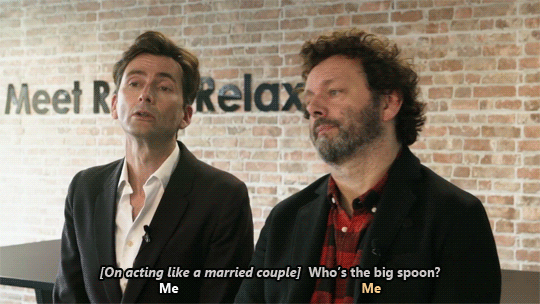
The epic trainwreck that is David and Michael's live version of A Christmas Carol is actually a hit, but everyone else has to convince them to stop the show because it can't go on forever. So they end it with Michael and David agreeing to take a break from working together even though it makes both of them sad.
But the whole premise of Staged was that everything was filmed on iPads, computers and cell phones. And it was submitted to Simon so he could piece it together.
Simon Evans wrote Staged as a love story between David and Michael. Simon writes what he sees and finds ways to incorporate fiction into reality. He saw them on Good Omens together and he saw the chemistry between David and Michael, and he turned it into a comedy about these two eccentric actors who clearly love each other. And they agreed to star in it.
They improvised most of it, but Simon laid out the framework of the plot for them to follow, and then he let them be themselves.
The entire show has layers upon layers of meta weaved into it.
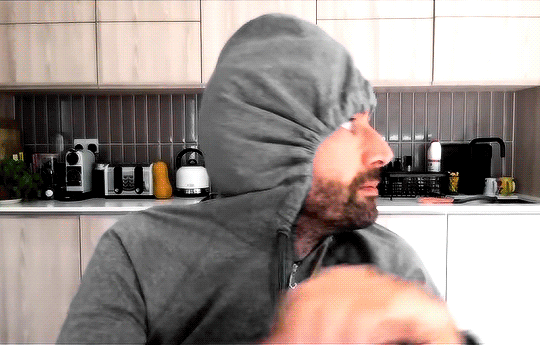
Anyway, my point is...
This post is one of several that covers the different ways discontinuity seems to occur during Good Omens 2. The evidence is very compelling.
I'm not here to point all that out because I don't have the strength of some of the meta writers in this fandom, and they're already on top of it, but if we look to Staged as an example, what is the plotline that Good Omens 2 is following?
Good Omens 2 is a modern version of....
Ep 1. The Arrival
Ep 2. The Clue (A Companion to Owls)
Ep 3. I Know Where I'm Going (The Resurrectionists)
Ep 4. The Hitchhiker (Nazi Zombie Flesheaters)
Ep 5. The Ball
Ep 6. Every Day
What are the stories happening around Aziraphale and Crowley? They're the focal point of season two, but what else is happening?
Neil Gaiman has said that everything means something. They aren't just showing us these things by accident. There is a story happening outside of Crowley and Aziraphale's relationship. And we are all looking closely for that person doing a very odd thing just out of sight or objects being moved around without knowing how they got there in the first place.

There was literally an entire scene in Staged where they are trying to figure out who is playing Scrooge and Simon is so anxious that he keeps moving his plant between two different spots in the room. It also ends up with Georgia accidentally planning her own birthday party because David is in Tokyo. But then they cut at one point and you learn David was actually in his bedroom and not a hotel room in Japan and Georgia didn't really just plan her own birthday party. That chaos was scripted. David has to change clothes, they have to go several minutes back in the scene they just did, but as Anna points out, the sun is not in the same place it was when they started the scene. And then Michael loses his shit at Simon and storms off.
You think that's the reason Simon left, but then we get the episode where Georgia tells David Michael wants to write the script and then tells Michael that David wants to write the script. She does it so she can get them alone in a room together because people love watching them argue. They find out she set them up about six hours later. They are hungry and hot and annoyed and mad at her so she gets Simon to come back to work with David and Michael. Simon comes back from cosplaying as a dentist, brings the food Michael ordered hours ago, and sits down to write. Michael gets pissed off at Simon again because Simon forgot the prawn crackers, so he throws his food at Simon.
Some of these are of the past. Some are of the present. They were all filmed at the same time though so you don't know what happened when or why.
These scenes are all cobbled together. They tell a complete story though. The order just isn't exact.

The story we are seeing in season 2 isn't the real story. It was happening around Aziraphale and Crowley, but with them at the focal point, you get a romantic comedy and it distracts you from what's going on in the background.
There is more than one story in season 2. It's basically a jigsaw puzzle that we can try to piece together, but we won't know what's actually happening until we get the much needed context of season 3.
There are clues all over the place in Good Omens 2. The story is being told through so many other methods except for the one that makes the most sense to us because someone doesn't want us to see what's coming, so we get distracted by Nina and Maggie, Jim, Aziraphale and Crowley.
We know Muriel and Saraqael are up to something. We know Shax and Furfur are up to something. We know the Metatron is up to something. What we don't know is where God went. We hear God's voice in Companion to Owls and we hear God's voice speaking through and with Jim when Crowley orders him to tell them what is going on. It ties directly to the first time Crowley and Aziraphale ever worked together.
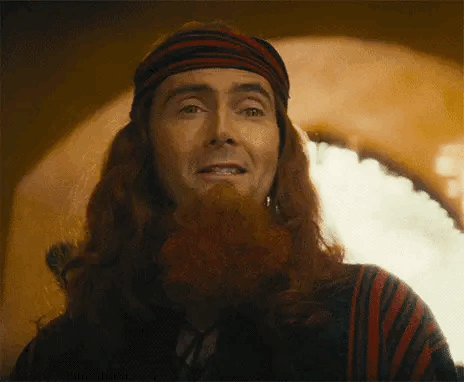
We know that Aziraphale is going to Edinburgh and he knows exactly where he's going because he and Crowley have been there before. It challenges the concept of good and evil because Crowley does the good thing and gets sucked into Hell. Right next to Gabriel's statue.
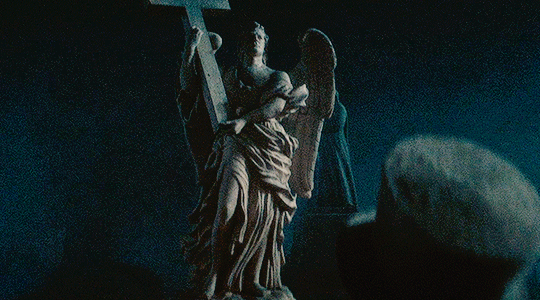
We know that Aziraphale picks up a hitchhiker even though he doesn't want to, and it turns out to be Shax. She reminds Aziraphale of the time that Furfur caught them working together. There were zombies and human magic tricks and Aziraphale uses sleight of hand to save Crowley from being dragged back down into Hell again.
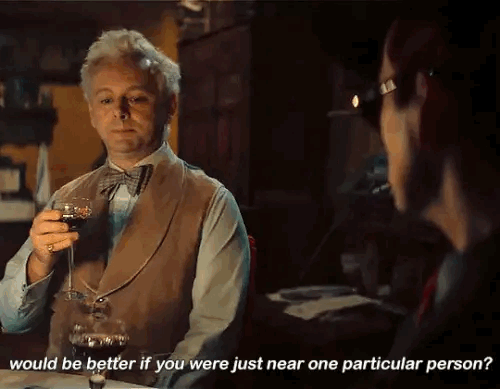
The episode titles of Staged 3 all represent different chapters of A Christmas Carol. But it was more than that because Michael is upset with David for doing adverts without him after they were both asked to work together at first. They love each other and they love working together, but it's preventing them from doing other things they want to do. Hence the break from working together.
It's a story within another story within another story.
And I think that's what we are witnessing in Good Omens. Things aren't happening in the right order. Beyond the sadness of Aziraphale and Crowley splitting up, there is still the next apocalypse to deal with. The story we are getting in season two isn't happening sequentially. It's being manipulated to hide the signs that things are already underway by giving us a love story as a distraction.
And it works very damn well. Because the love story was beautiful.
Staged 3 ending
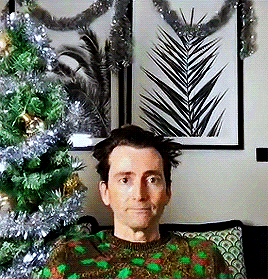
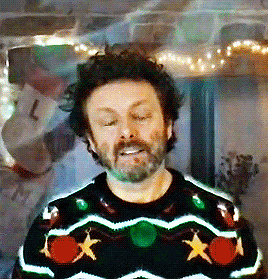
Good Omens 2 ending
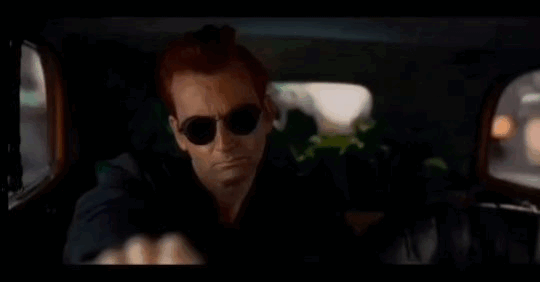
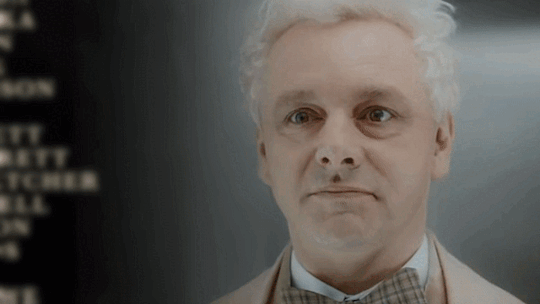
#good omens#good omens meta#good omens theories#i am in no way saying that this is the answer#but it hit me while i was watching staged#staged#david tennant#michael sheen#aziraphale#crowley#ineffable husbands#michael and david
227 notes
·
View notes
Text
Whose POV is it Anyway?
Bodysnatchers & Cosplaying a bookseller
DO NOT ASK NEIL ABOUT FAN THEORY
I'm back! I took a few days off of doing internet thingsss so I took a break from writing this series of posts but I'm back and continuing with episode 3 in its entirety!
For reference & context, I recommend reading these posts:
Whose POV is it Anyway? - Introduction
Lens Filters
POV "Your 'Something's Wrong' Voice"
POV a Trip to Hell and a 25 Lazarii Miracle
POV a Companion to Owls
POV The Dirty Donkey & I think I Found a *Clue*!
Shall we get cracking?
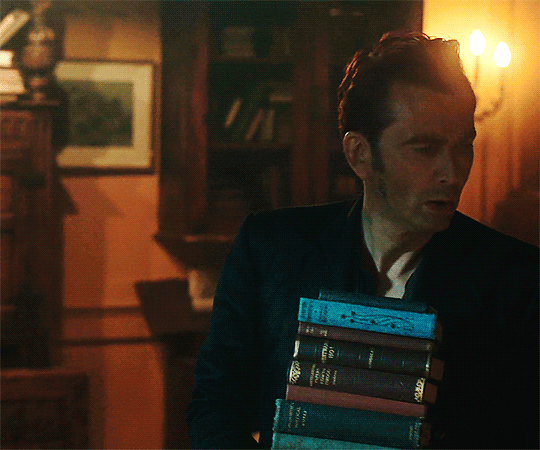
Episode 3 gifts us the arrival of Muriel! Sweet adorable Muriel! We see them arrive to the bookshop, with the Bronze Glimmer Glass filter in full effect. Aziraphale is the only one there so it makes sense we'll have Aziraphale's POV to start. Cupperteas ensue, and Crowley arrives to be grumpy but fully accepting that Aziraphale is taking their car, I mean, he's already brought the plants inside. His sideburns are long here as well.
When the duo head into the backroom to discuss what's going on, the filter changes, the lighting is much cooler toned, and we're now looking through the Black Diffusion FX filter in Crowley's POV. Crowley's sideburns are also short now, and if my theory that POV is also correlating with his hair length, it's standing here.
As Aziraphale drives off, we see Crowley watch him from the window and sigh, sideburns still short, still his POV.

I'm going to stick to the present day storyline and switch to the bodysnatchers minisode at the end!
The time Aziraphale and Crowley spend apart in this episode is interesting to say the least. If we're trying to look at the lighting and possible lens filters used to determine the narrator or POV for these scenes... I think they're switched!
When we see Aziraphale driving the Bentley, the scene isn't awash with glowy warm lighting which we know isn't reserved just to the bookshop since we've seen it used in the record shop, coffee shop, and in the Job flashback.
It's rather cool toned lighting for a yellow bentley. Aziraphale's whole trip to Edinburgh is cool toned. The time he spends in The Resurrectionist, the graveyard, everything. I would have expected Aziraphale's magical little newspaperman cosplaying extravaganza to be dripping in his golden glow through the gorgeous Edinburgh when I started thinking about the scenes and these lense filters and these metas.
But then you look at the opposite, Crowley alone in the bookshop with Jim. Something he would hate right? Sounds like worst case scenario for him. He loves the bookshop but he's there alone with Gabriel who tried to kill the person he loves more than anything and didn't have an ounce of compassion, while Aziraphale has taken himself and his car very far away.
But what is Crowley's experience like? He and Gabriel are chummy as ever, they talk about rainstorms, vavooming, gravity. Crowley dresses down and is wearing sleeve garters? A bit old fashioned for Crowley but not for Aziraphale no? He's playing bookseller, carrying books around, albeit not quite correctly, chucking them at the end. Every scene is drenched in warm golden haze and Crowley's sideburns are long the entire time.
They aren't together, but they've always probably got one thing on their mind...
I think we're seeing these scenes through each other's eyes, or the POV is swapped if you will. Maybe that's why Crowley is wearing sleeve garters and cosplaying bookseller and being very kind to Jim? And Aziraphale is being the worlds cutest little investigator to ever exist. I think maybe they're imagining each other, or it just points to the idea that they're apart but still the only thing they're always thinking about.
Okay, cute lovebomb, now let's talk digging up dead bodies!
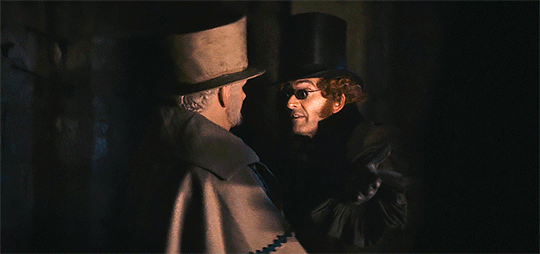
There isn't a lot to go off of for lighting in this minisode, but there is one detail I wanted to point out that has to do with Crowley's hair length. In all locations BUT the crypt his mutton chops are longer. When they enter the crypt both times, they are shorter.
You can see they are a distinct "J" shape in most scenes but in the crypt scenes (for example when he drinks laudanum and busts through the roof) they have been trimmed back). So if I'm going just on hair length, all scenes except the crypt are Aziraphale's POV.
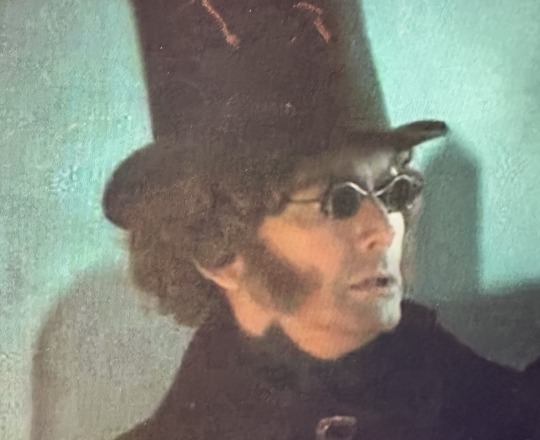
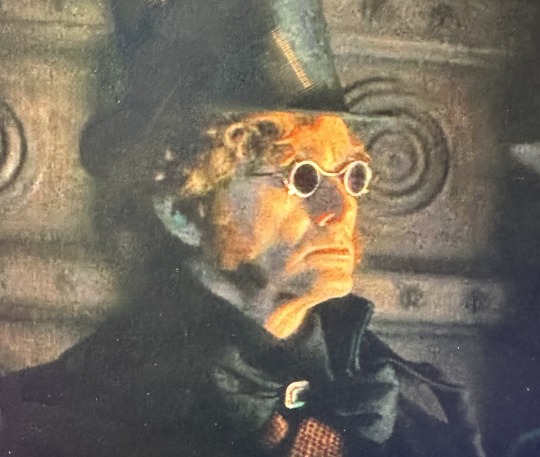
If you can look past my terrible image quality, you can see on the right image his chops are notched where on the left they're doing the opposite.
NEXT
POV 1941
#good omens#good omens 2#michael sheen#good omens meta#crowley#david tennant#aziraphale#crowley x aziraphale#good omens theories#good omens clues#good omens theory#good omens clue#good omens fandom#good omens analysis#ineffable mystery#ineffable divorce#ineffable spouses#ineffable idiots#ineffable husbands#ineffable fandom
128 notes
·
View notes
Text
First-Order Archangels
Part 1: Maybe You'll Spot An Archangel
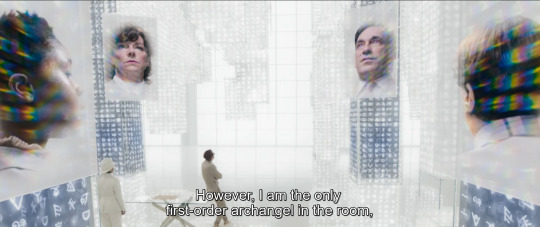
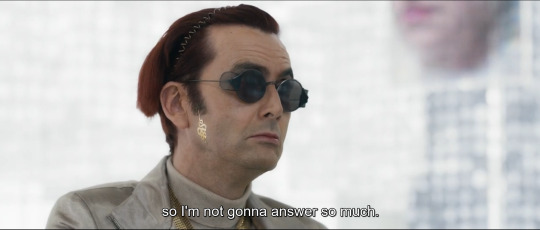
GABRIEL: I told you you could ask. However, I am the only First-Order archangel in the room, or, you know, the Universe, so I'm not gonna answer so much. But you feel free to knock yourself out with all the asking.
While I was writing my meta series The Passion Of Jimbriel it became fairly obvious to me there was something more going on between Crowley and Gabriel in S2 than just the numerous pointers to Crowley's pre-fall angel status. They are acting as both parallels and foils to each other, and in places you can swap their characters and get the same story at a different time – and that just opens up a whole new window of context and insight into things. For pre-reading, see this meta from @vidavalor that nicely lists some obvious parallels. It doesn’t mention everything though, so I’m going to discuss parts in more detail.
A foil is a character who contrasts with the protagonist, to highlight or differentiate certain qualities between the characters. Crowley and Gabriel do this because they have come from essentially the same place, and share some story elements, but they still end up in different places.
There is a lengthy original discussion about Crowley's pre-fall angel status here, for pre-reading. It points out the obvious and some not so obvious points that ops have noticed in S2 telling us about Crowley's pre-fall status. Rather than just go through them all again, I'd like to look at some other scenes in S2 that also tell us something about both the similarities and the differences between these two high-powered entities as I go along. In addition, I’ve done a series of posts looking at Gabriel as a shoulder angel (links at the end of post,) because quite often he’s on the demonic left-hand side – which makes sense when you realize he’s a Crowley parallel.
Take the arrival of Gabriel to Whickber St and the bookshop. I’ve already mentioned this parallel story line a couple of times now, but lets look at it again in more detail. It mirrors the opening of S1E1 where the serpent climbs the wall of the Garden of Eden, morphs into a demon and starts to converse with the angel standing on the wall.
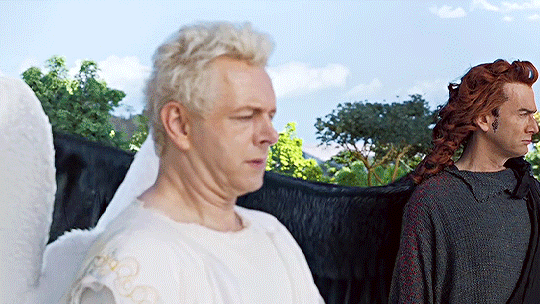
Back in the present day, we have a Gabriel, who also tends to present on the sinister-side, walking up to the gate of the present day Garden (the bookshop), which is still guarded by the same angel as it was 6000 years ago, and basically tells Aziraphale he has “fallen.”
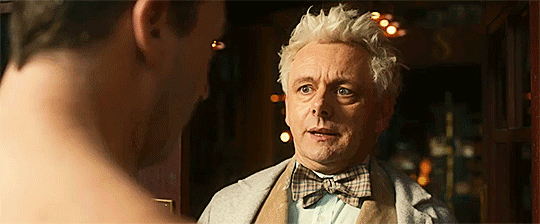
How to we know this? It is a reference to the Fall of Man, when Adam and Eve ate the apple the serpent offered them, they suddenly became aware of their nakedness, and hid from God. Gabriel has already upset the love-apple tomato cart on his way to the door of the bookshop, its a sign of the chaos to come.
The fallen angel is not sure of his name, so he prompts with a question…
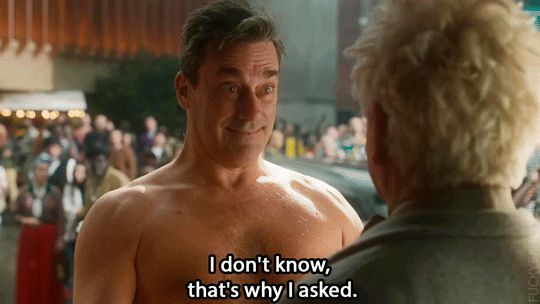
And asks for shelter under the (reluctant) angel’s wing..
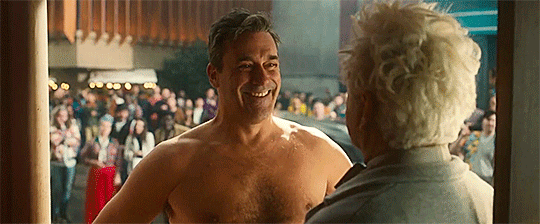
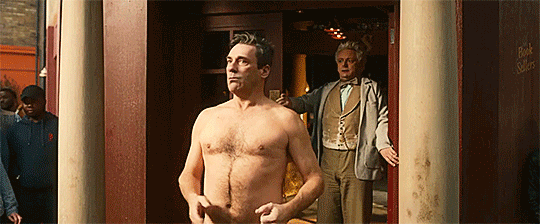
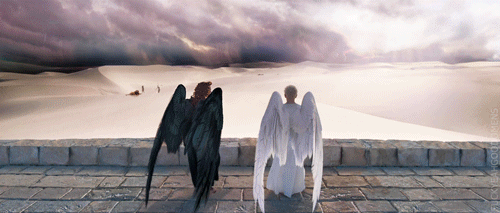
But there is one thing he does know, the one thing that drew him to Aziraphale in the first place:
AZIRAPHALE: Then why did you come to my shop?
GABRIEL: I don't know. I just thought I should. You know what it's like when you- when you don't know anything at all, and yet you're totally certain that everything would be better if you were just near one particular person?

Later, Aziraphale realizes that he must give Gabriel a new name to hide him – because fallen angels take on a new name, don’t they? Just like Crowley did.
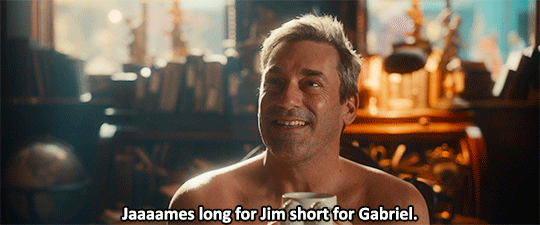
Then we get a confession:
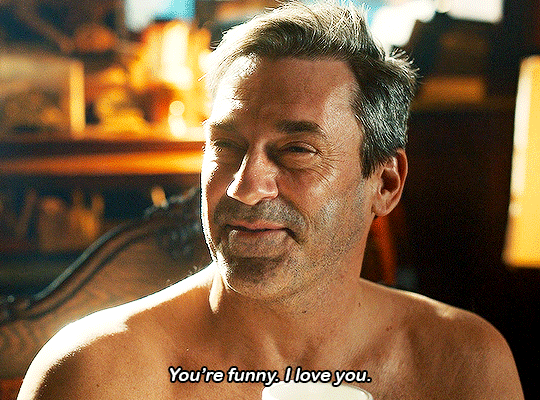
Which is what Crowley loves about Aziraphale as well - that bit of unpredictability, because you know how humour kind of works? It throws the unexpected at you.
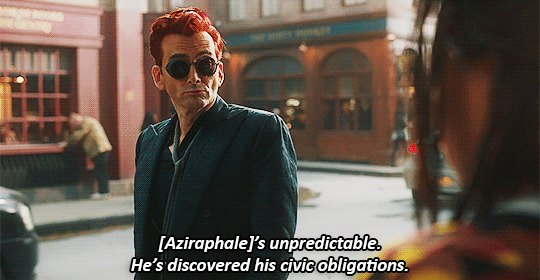
Early on in S2 we find out they are both in trouble: first His Royal Smugness, then Our Hero himself. Our view is turned upside down, with the angel made the bad guy and the demon the good guy who needs to win. But both of them are being hunted by Shax.
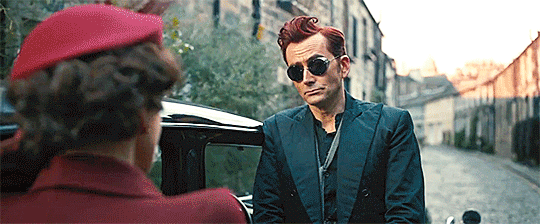
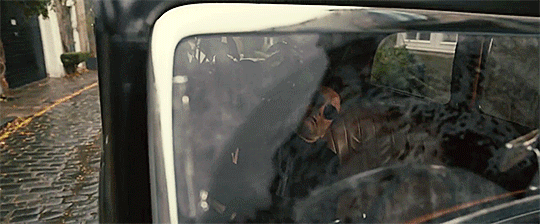
Then we get one of the early clues pointing to Crowley's high status as an angel:
SHAX: A miracle of enormous power happened last night. The kind of miracle only the mightiest of Archangels could've performed.
CROWLEY: Mm?
SHAX: Somewhere very close to your friend's bookshop. Are you telling me you don't know what caused it?
CROWLEY: How'd you know I didn't do it?
Shax stalks and threatens both of them, sometimes at the same time:

Another parallel Gabriel and Crowley shared in S2 were associating their identity - no, lets rephrase that - "essence" was one description I've seen - with boxes.
Gabriel arrives with a box that strategically covers his front, and quickly tosses it aside once Aziraphale opens the door to the bookshop. It lies forgotten until Gabriel mentions it a while later. Inside it is the fly from Beelzebub - an object from Hell - so it really needs to be 'invited' across the threshold of the bookshop by Aziraphale to be able to enter. The box initially appears to be empty, Once inside, the fly is free to roam. It has a message written on one side of it.
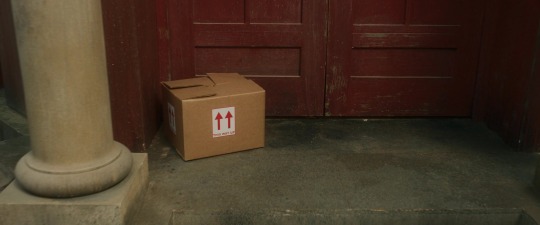
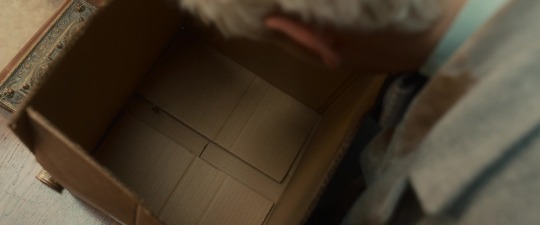
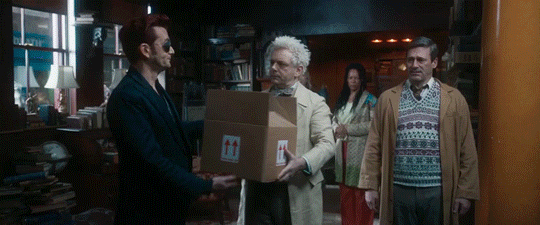
The same goes for the matchbox. Message included.
ah, wot? you say. Yep.
The matchbox represents Crowley, probably in more ways than one, but I'll just go through the stuff relevant to this meta here.
I notice I'm not the only op to connect the line from the Book of Job on the side of the matchbox with Crowley. The line is from Verse 41, which talks about Leviathan. Among the various shapes it is described to take is a great sea serpent. This deserves its own meta for further discussion, which I plan to do after this one, because yes, Crowley is Leviathan in disguise, but there is much more to it than that. But for now, just know that the matchbox is Crowley.
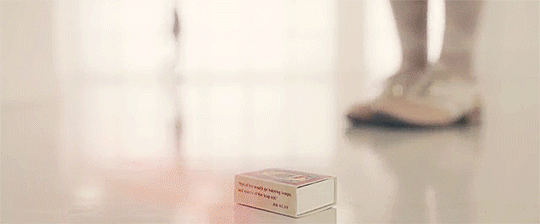
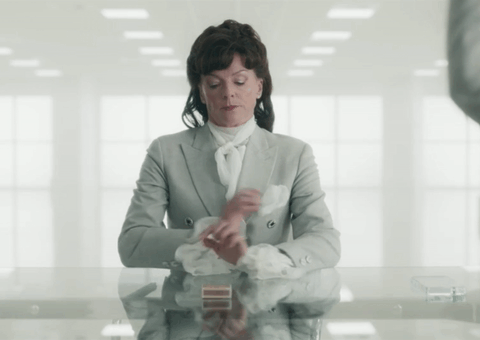
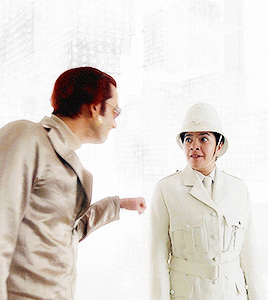
Once you know this, it makes sense that Muriel finds it - a discarded cardboard box by the front door to Heaven - and deals with a material object that shouldn't by rights exist in Heaven. Then a certain demon finds Muriel lurking outside during the siege on the bookshop at the end of S2E5, and talks them into letting the certain demon be escorted up into Heaven where he doesn't belong, where he's free to roam around - only he needs a guide because he's not sure where to go. Ah Muriel, you poke the Serpent, he's going to poke you back. Good thing he likes you, and it just was a gentle nudge.
Two empty boxes, two cases of memory-loss. That is what S2 seems to suggest to us at first glance.
Gabriel's seems to be the most straight forward in hindsight - find the fly and restore Gabriel to his original "Gabriel-ness." But its more complicated than that. When pushed to remember, his lilac eyes return and another voice can be heard speaking through him of the past. This happens twice, with the second one being part-prophecy. What is really triggering these episodes of channeling? Is it God or someone else speaking through him? We really aren't sure at this point in time.
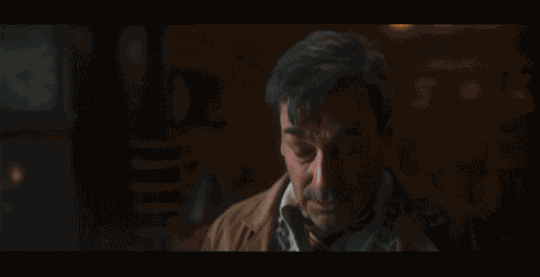
Then there are questions around Crowley's memory. Did he have his memory wiped when he fell? Was it wiped repeatedly? Was it not wiped at all, and he just pretends he doesn't remember? Neil has even said he is an unreliable narrator about his own Fall, so who are we to trust at this point? Crowley does seem to understand in the end some of the problems Gabriel is having with his absent memories and that brings them to a temporary truce.
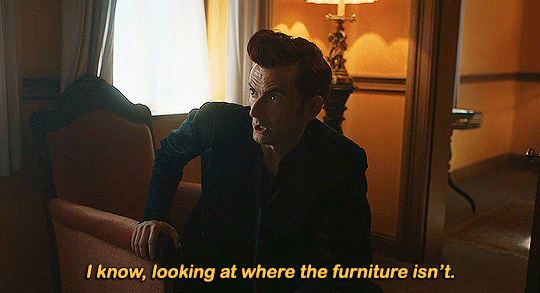
Both Aziraphale and Michael inspect their respective "empty" boxes, and neither notices anything obviously amiss. Gabriel's box just seems empty to Aziraphale, he takes no notice of the fly container in there, and archangel Michael tentatively inspects the matchbox brought to them by Muriel but nothing seems out of place there either.
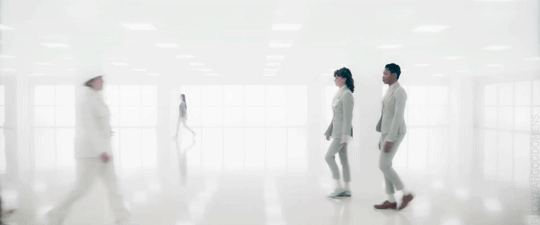
Crowley's change in costume in Heaven during his little infiltration caper with Muriel is also another clue to his past status as an archangel. He has a silvery-gray suit, similar in style to Saraqael's to reinforce the link with them, but at the same time he is also mocking the other archangels and their elite status. We've assumed for a while now that the appearance of the tactical turtleneck signals that Crowley is up to something sneaky or spy related, but I'm starting to think it also relates to a bit of a power play (and Crowley certainly laid the power on for Mr Brown in the pub!) Looking back at S1, Gabriel's not adverse to wearing one either when he needs to be at his worst (or best. Your choice.)

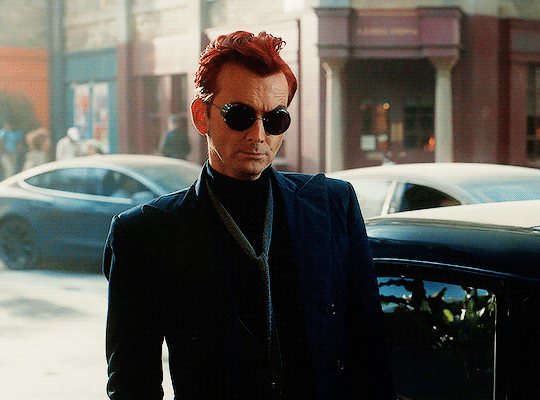
The way one dresses is a way of expressing and reinforcing authority, and its something both Gabriel and Crowley do without much thought. They have been used to being in a position of power and/or independent authority for much of their existence, and I would say that even if Crowley is a few steps down now from where he started, and he's more cautious around those higher ranking than him than he used to be, he still retains that knowledge of what its like to be at the top.
Crowley's usual near all-black costume is a form of power dressing in itself. Whether is was in the past, when black was an expensive color to buy and maintain in clothing, or in the present day, we are still respectful of those in a stylish cut of black.
Gabriel's impeccable tailoring as Supreme Archangel also commands respect. So it's no wonder that one of Gabriel's first requests on regaining his memories was to ask for new clothes! He wasn't just being the vain archangel we believe him to be (although, I think there is still some of that) you also need to consider the elements of the reference characters that went into his shop assistant character: Granville, the belittled shop assistant nephew from the sitcom Open All Hours, who got stuck with all the shop duties from his uncle and felt like life was passing him by, and the silly Monty Python gumbies, that complained of hurting brains - lovable and much loved characters, but not ones you'd really want to be forever. We all want to be loved, but we want to be respected as well.
For all his fierce posturing around Gabriel, there is a brief moment in S2E3 where Crowley backs down and treats Gabriel as an equal - and that is reflected in a change of dress as well. His outside jacket off and sleeve-garters on, Crowley sports a look we haven't seen since S1 when he was home alone in his Mayfair flat. He patiently explains gravity to a curious Gabriel and then describes his "Operation Lovebirds" plan to his puzzled companion. He admits he hasn't "done weather in ages." It's just a quiet, charming moment, watching two ex-archangels get along together.
You're smiling, aren't you?
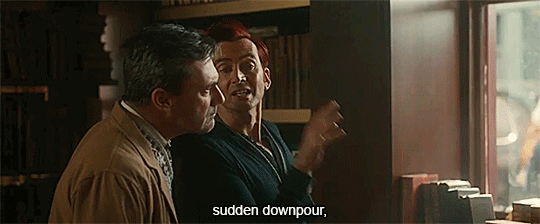
This meta continues in Part 2: Foils of War, where the differences between Gabriel and Crowley get explored in more detail, and how Aziraphale and Beelzebub act as mirrors to each other a few times as well.
This meta is part of a series on Gabriel:
Gabriel as a Shoulder Angel: S1 Study
S2 Study Part 1: Ep.1 The Arrival and Ep. 2 The Clue
S2 Study Part 2: Ep.3 I Know Where I'm Going and Ep. 5 The Ball
S2 Study Part 3: Ep.6 Every Day
First-Order Archangels Part 2: Foils of War
First-Order Archangels Part 3: Seeing Eye to Eye
#good omens#good omens 2#good omens meta#crowley#gabriel#the only first-order archangel in the room#or you know the universe#aziraphale#garden of eden#fallen angel#his royal smugness#how will our hero cope#maybe you'll spot an archangel#book of job#vavoom
174 notes
·
View notes
Text
Qi Rong, the Ghost King of Mirrors - Pt. 1
Before we begin, I must thank @diedikind who incited me to create this meta! They also write good TGCF metas as well, so if you have the time please check them out! Another thing to note is that I am writing this meta using mostly the unrevised version as my main source material. While I have read the Fangxin arc in the revised version and seen tidbits of the changes done to his character, I may not be aware of them all, so please keep that in mind. Also, don't be afraid to correct me if I accidentally got my facts wrong!
I’ve been thinking a lot about Qi Rong lately. In particular about his prince name, Xiao Jing (小镜). It roughly means “Little Mirror”/“Little King of Mirrors” (as @diedikind pointed out in the notes of this post) and frankly? There’s no better name MXTX could have chosen, because when you really look at him, you know that, both as a narrative device and as a character, “mirror” is very much what he is. He serves as a foil to a good number of characters, but also reflects a lot of traits from his environment and people around him, not to mention his habit of literally copying others. This is all reflected on how much Qi Rong tries to have his own identity, but because he’s stuck in an immature mentality, refusing to grow up, he ends ups stuck in a “child” role, making it impossible to truly have an identity of his own. This is even lampshaded by Hua Cheng in the aftermath of the mecha battle as Qi Rong is “dying”, when he notes that there’s nothing really noteworthy about him, despite Qi Rong always working towards standing out from the others.
There’s a lot to unpack about his mirror symbolism, so I cut it in parts. This one is going to focus on how he mirrors Xie Lian and the Kingdom of Xianle itself. This is also quite long, so don’t open “read more” unless you’re ready to read a big Qi Rong meta.
Qi Rong, Xie Lian and the Kingdom of Xianle
“I don’t need your help, not like this. Are you really avenging me? Or are you avenging yourself?” - Xie Lian, Chapter 26
The most obvious foil Qi Rong has is Xie Lian, the protagonist himself. His relationship with Xie Lian is by far the most important alongside Guzi, something that is made obvious with how obsessed Qi Rong is with him, a fixation that also mirrors Hua Cheng's and Jun Wu's (I will touch on this in on another part). The mirror symbolism already starts early on in his life, with him being immediately noted to be similar to Xie Lian when they’re children, and if I remember correctly his prince name was even given to him because of said similarity. Since childhood Qi Rong was already seen as nothing more than a “little mirror” of Xie Lian, and, after the lantern incident, Qi Rong himself (probably subconsciously) started to see himself as such too.
From there, Qi Rong starts to project his entire identity and psychological needs onto Xie Lian. He’s never been a very well liked figure since he arrived in the castle, but that doesn’t matter, because Xie Lian is. He’s not a very accomplished person, but that doesn’t matter, because Xie Lian is. He may not be a god, but that doesn’t matter, because Xie Lian is. Unfortunately, this is two-street: he also views Xie Lian as a “big mirror” of himself. Someone insults Xie Lian? That’s seen as a direct insult to him too, so he feels entitled to beat them up, even when that’s not what Xie Lian wants at all. This is likely the main reason on why he hurt Hong-er (alongside of what was probably jealousy too, but that’s for another analysis for another day), lampshaded by Xie Lian himself: he saw Hong-er changing the course the God-Pleasing Ceremony as a sign of bad luck and an insult to Xie Lian, and therefore an insult to himself too, ergo, he’s entitled to hurt him, or, using Xie Lian’s words, “avenge himself”.
Aside from himself, he also projects his dire need for a paternal figure onto Xie Lian too (this is better explained in this meta translated by @baiwu-jinji), viewing him as a source of power, safety and affection. In other words, everything Qi Rong wants to have and wants to be, he projects onto Xie Lian. That’s why Qi Rong was among the first to turn against Xie Lian after the walls fell: if Xie Lian fails, he’ll be viewed as a failure. If Xie Lian is a laughing stock, he’ll be viewed as one too. If Xie Lian couldn’t protect the kingdom (and by extension Qi Rong himself) from Yong’an, then that means he failed at the role he subconsciously put Xie Lian in: the role of a father. This is why his obsessive hatred towards Xie Lian is so singular, but, despite all that, Qi Rong deep down still craves his attention and understanding (another Jun Wu parallel - i will also touch on this in another part). He hates his “father”, but he still doesn’t give up that idea towards Xie Lian, even calling himself mockingly his “little brother”. This may be why MXTX made him force Xie Lian to take care of him and Guzi in the revised version instead of Xie Lian being the one forcing him to stay in Puqi shrine: no matter how much Qi Rong despises him, he still sees his cousin as his “caretaker” in a way. And this is just me theorizing now, but part of me thinks his lantern symbolism/aesthetic may be a way of mirroring the lantern incident, the moment that truly made him Xie Lian’s little distorted mirror.
We already went through Qi Rong’s point of view of their relationship, but the mirror symbolism doesn’t stop there. From both a narrative standpoint and Xie Lian’s point of view, Qi Rong serves as a little mirror of the Kingdom of Xianle itself. Being half-xianle and half-yong’an, he went through both worlds, and as much as Qi Rong denies his Yong’an half, he was just as shaped by his experiences there as when he was in the capital of Xianle. He’s been both the poor and abused kid from Yong’an (it was only in his first five years of life, but these years are very important in a person’s life), a scandal and sore thumb in his family tree, and he’s also been a privileged Xianle royal who abused his power to get what he wanted like so many other royals. Hell, Xie Lian himself tells us he probably became worse over the years by mirroring the King and the rowdy crowd he hung out with in his youth. This post made by @essekknits points out the fact that Qi Rong has always been mimicking and mirroring those around him, especially the ones he perceives as having power, without ever understanding the logic behind their actions, and this is something he keeps doing long after the fall of Xianle.
Even after death, he continues to haunt Yong’an, being responsible for the Gilded Massacre, an event that contributed to the decline of the kingdom, a literal and metaphorical ghost from a bygone era that nonetheless is still felt. This is why MXTX making the confrontation between Qi Rong, Xie Lian and Lang Qianqiu in the Mausoleum in the revised version, complete with the later two, viewed as “enemies” of Xianle, being severely weakened there while Qi Rong had made the place a lair for himself, is a change I actually like a lot. He’s the personification of Xianle who even after death continues haunting both Xie Lian and Yong’an.
This is why Xie Lian’s hatred for Qi Rong is very singular too: Qi Rong is a mirror of everything he hated about Xianle. He represents the cruel nobles who used their power for selfish reasons and the people who adored and revered him but constantly went against his wishes and then went on to betray and humiliate him once he couldn’t keep up with their expectations. Xie Lian was treated like an adult with responsibilities way beyond his age, being forced to grow up early, and Qi Rong putting him in a “fatherly” role encapsulates that. He often had to “parent” Qi Rong (something that ultimately failed) when no one else did despite being a child himself, just like how he became a god too early and had to attend to the needs of multiple people who put all their expectations on him. Even after Qi Rong's death, Xie Lian is still forced to clean up after his messes, from having to protect Lang Qianqiu from him, to having to seal him up after the Guilded Massacre, to ultimately ending up in a coffin for roughly 100 years because of his shenanigans. Even in the events of the current timeline Xie Lian was still forced to “parent” Qi Rong often when he was in Puqi Shrine.
(As a side note, one thing I found curious was Qi Rong begging for Xie Lian to save him as Hua Cheng was beating up in the mausoleum in the revised version, even wondering how Xie Lian could even let him in. It could be chalked up to pure entitlement and a complete lack of self-awareness on Qi Rong’s part (which it is), but I think it also illustrates very well the fact that, despite viewing Xie Lian as a failed parental figure, he still expects him to protect him like a father should. It can also represent the fact that, even after completely rejecting Xie Lian, he’s still somewhat viewed as the protector god of Xianle, despite being branded as a traitor.)
With this all being said, there’s one last thing Qi Rong mirrors with Xie Lian: his character journey. It’s not very noticeable at first, but it’s still there. Like Xie Lian, Qi Rong starts out as a prince who ends up falling from grace after his kingdom collapsed. In the same way Xie Lian is seen as the laughingstock of the heavens, Qi Rong is hated and viewed as a pure nuisance by most of the ghost realm. And while the circumstances are completely different, the thing that helped save Xie Lian in one of his lowest points, which was the genuine kindness of the Bamboo Hat man and his own kindness towards Hong-er/Hua Cheng, is also what made a better side of Qi Rong resurface: the genuine affection Guzi had towards him. Even in his worst moments, Guzi never gave up on Qi Rong, and I think this is what ultimately made him a bit better towards the end. (I will shut myself now about his relationship and mirror symbolism with Guzi because that’s for another part).
As pointed out in this post by @baiwu-jinji, something I think is worth talking about is that his relationship with Xie Lian is probably meant to mirror the obsessions of fans and antis towards celebrities. I may be wrong about this, but considering MXTX’s own experiences with these sorts of people, I have high doubts this wasn’t the intention, and she’s no stranger in writing characters with this sort of commentary (hello, Shen Yuan). This may be why he became more deranged in the revised version too. He’s probably meant to represent the kinds of fans who place all their self-worth and identity onto their favorite celebrities, acting as if they know them personally and attacking other people in their name (often against the celebrity’s wishes), sometimes even viewing them as quasi-parental figures in more extreme cases of parasocial relationships. These kinds of fans usually become enraged when the celebrities they love end up “falling from grace” in their eyes, and they usually go on to become the worst of haters, who keep on obsessing over said celebrity, but this time to bring them down, harass and humiliate them.
(As another side note, while I think Qi Rong is not a character made with love, I don’t think he’s meant to be a pure hate sink either. MXTX still went out of her way to humanize him enough, and she gave him a subtle character arc with Guzi, which I will talk about on another part of this meta. Hell, the mere fact that he has so many facets to talk about is a sign of good character crafting, and he’s not even a main character!)
#qi rong my beloved. i have so many thoughts about you#anyways. this is my first meta. i hope i was able to do him justice#tgcf#qi rong#xie lian#tgcf meta#heaven official's blessing
29 notes
·
View notes
Note
Hi! I love your writing think it’s phenomenal work. It’s really such a genuine and intimate depiction of Ginny. I also see you have an appreciation of Dean Thomas. I’d love to know why you think Ginny was attracted to him? What do you think their relationship was like and how did it help them for their next partners? I just think that pairing was really interesting and there’s not enough of them being friends.
❗️ Warning... big Dean & Ginny meta incoming ❗️
Firstly - thank you so so much for reading and enjoying my work (phenomenal!!! I’ll dine out on that all week - can't thank you enough).
Secondly - what great questions! This was such a fun thing to think through. Dean’s a quietly lovely character I have so much time for, despite being very underdeveloped in canon (cutting his arc to exclusively favour Neville’s? Side-eye forever). I'm definitely a paid up member of the Dean Thomas Fan Club.
Anyway….. the questions were so good I wrote this too-long meta on Ginny and Dean before going to bed because I apparently… cannot be stopped?
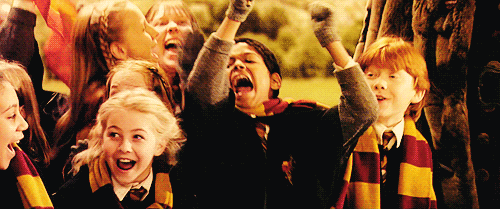
Why was Ginny attracted to Dean?
I think for this question it’s important to think about the timing of when Ginny and Dean became close and when they got together, and especially what Ginny was looking for during and after her relationship with King of Negging, Michael Corner. There are three weeks between the break-up with Michael and Gin getting together with Dean, so we can assume Ginny and Dean had already become close and maybe a little flirty when she was with Michael (Ginny Weasley likes to give herself a nice four-week breather between boyfriends, usually just in time to watch the early summer weather roll in. I for one respect the work rate and the consistency.)
Ginny is with Michael until late in her fourth year, until they break up after the Quidditch final in early June. Dean has his OWLs until late June (just realised Ginny dumps Michael right before his exams - this is how you get revenge on a Ravenclaw).
The events in the Department of Mysteries take place the day exams finish (cue iconic scene where Harry’s rushing up to the dormitory to grab his Cloak and save his godfather’s life and Seamus and Dean are trying to get him on the sesh, absolutely rate it, excellent from the lads). Ginny’s going out with Dean by the time she gets the train home, probably by the end of June.
Given the short turnaround time between relationships, I think it’s likely Ginny and Dean became close during the rest of the school year, where she was able to learn the following things about him (and implicitly compare him with Michael as Michael revealed himself to be, as the great prophet Ronald foresaw, ‘a bit of an idiot’):
Dean Thomas knows right from wrong (and really, really can’t stand Dolores Umbridge). In their first lesson with Umbridge, Dean is by far the person in the class who stands up to Umbridge the most after the trio (he actually comes out swinging a lot more than Ron does). He immediately subs in for Harry when Umbridge refuses to answer any more of Harry’s questions. He defends Lupin and Crouch-as-Moody when Umbridge criticises them (describing Crouch-as-Moody as a maniac but saying ‘we still learned loads’ is extremely funny - Dean's pedagogical expectations are low). Dean is an extremely enthusiastic DA member, he and Ginny often arrive at meetings or take part in dinnertime conversations about the DA together, and I think they likely became mates because they’re passionate about what the DA is trying to do. We know Gin likes a boy with a moral compass, a backbone, and a good sense of outrage in the face of injustice. (I cut this out of a much lengthier first draft of chapter one of Beasts, which had all the DA at the graduation ceremony, but this was their interaction in response to another character acting up: ‘[Ginny] feels an old rush of affection for Dean, a man who always had a good scowl in him when it mattered.’)
Dean’s a sweetheart, even if he’s a bit hopeless. Dean’s a character who is often trying to make people feel better about things and trying to give a bit of comfort – emphasis on trying, because he’s not always good at knowing exactly what to say. I think this is something Ginny would really value – she’s someone who, for all her fire, tries to comfort and support the people around her. I reckon she’s got a soft spot for a man with a heart in the right place and a chronic inability to find the right words to express it. ('“Don’t worry about it, Harry,” Dean muttered, hoisting his schoolbag onto his shoulder. “He’s just . . .” But apparently he was unable to say exactly what Seamus was, and after a slightly awkward pause followed him out of the room.' OotP, 221 - does this not sound like how Harry would try and comfort someone?) 👀
Dean is kind to the underdog. Dean is often seen hanging around with or partnering up with Neville, and in DH, we’ll also see Dean be very kind towards Luna. I think Ginny rates people who are kind to those who are socially awkward and excluded.
Relatedly... Dean loves Remus Lupin. I wrote about this a bit in this short reflection on Remus (and am writing about this at the moment so don’t want to get too spoilery if you’re reading Beasts…), but I have a feeling being Remus Lupin’s biggest fan would be a sure fire way to get a text back from Ginny Weasley.
Dean’s into sports. Like her soulmate, Ginny’s into fellow jocks (I think it's implied that Michael Corner was also on the Ravenclaw Quidditch team – three for three on Quidditch players, Ginevra, if you were on Love Island I’d say you have a type). I think she’d also be amused and endeared by Dean’s die-hard commitment to West Ham - she is Arthur Weasley’s daughter, after all, and she probably enjoys teasing him about how crap football sounds. (That bit in PS/SS where Dean’s yelling ‘send him off, ref!’ – 10/10 excellent Dean content). Also Dean does not seem threatened by Ginny’s Quidditch abilities, but instead just really wants to be on the team with her too, which is a nice change from Michael Corner, the Jack Berger of Hogwarts Quidditch. (Sorry Michael, I know you end up a gold star goodie by DH, but young Mike is a prick to our girl Gin).
Dean is a laugh. Chuckling at Ernie Macmillan in his Apparition classes, mucking about with mice in Transfiguration, getting the giggles because this Lockhart bloke has set a quiz asking students to name his ideal birthday gift: Dean is both fun and funny. That bit in GoF where Dean describes Warrington in Slytherin as a ‘big bloke who looks like a sloth’ – funny. The bit later in GoF where Dean rinses Harry for rejecting that curly-haired Hufflepuff girl who wants to go to the ball with him – also funny. Ginny Weasley likes a comedian and she also likes an audience. I think that means a big tick in the Dean Thomas column.
Dean's a creative. This is verging on headcanon territory, but I really do love the idea of Ginny finding her way back to writing in the years after Riddle and the diary. I can see her being drawn to someone who also has this gentle, expressive, artistic side to them.
Dean’s not averse to dealing in contraband Firewhiskey. If you’re a fourteen year old popular girl with a rulebreaking streak, the boy who can source you some Firewhiskey for an end of exams party from a cool kid like Harold Dingle is hot property.
Dean… er, really likes Harry. Not Gin's finest criteria for a boyfriend, but I think In GoF, the man draws Harry flying around the Horntail on his Firebolt and draws Cedric, his rival, with his head on fire. It’s not a hugely good look for Ginny, but I reckon Dean really liking Harry probably, in a strange, back-to-front kind of way, is another vote in his favour (Gin, you're messy, and I love you for it).
What was their relationship like?
I loved thinking about this question! It’s easier to write about why Ginny and Dean broke up than it is to write why they stayed together so long, and what good stuff they took from the relationship. Dean's easily bashed in Hinny fic in all sorts of different ways, and I don't think it really tallies with the really positive impression we get of him in canon. Ginny and Dean spend a lot of time together over the year - eating most of their meals together, training together, spending all of their Hogsmeade time with each other. I know it’s a teenage relationship, but this is still so much time to spend with one person. It also actually takes them quite a while to breakup, even if they’re ‘rocky’ for much longer. There's something to their relationship that must, on some level, have worked quite well. After all, it would have been a lot easier for Ginny to have dumped Dean if he was a crap boyfriend. It’s much harder to dump someone who is a good partner, but not the right partner for you.
I think that's the problem for Ginny: Dean was kind of perfect for her in lots of ways - but for the person she would have been if Riddle hadn't happened to her, and if the war hadn't happened. Their relationship was clearly based on a lot of mutual attraction and chemistry (that kiss Ron and Harry saw was intense, lads - there's a reason Harry was threatened by it, after all). I think Dean was proud as hell of Ginny, especially on the Quidditch pitch (he's so excited to tell her he's going to be on the team with her!). I think he would think she's super cool, and I like fics and headcanons about Dean that show him trying to internalise his feelings about his own dad into doing right by his girlfriend, even if that means overshooting and being overly chivalrous and over-protective with Gin. I think one of the reasons Ginny stayed in the relationship so long is because they genuinely got on, had a laugh with each other, and fancied each other, in a way that she would feel conflicted about when she still feels drawn to Harry.
Really I think it's Dean being so great that is the problem for Ginny. If she's with this really great guy and she's still feeling restless and like something's missing, she knows that means she's still not over Harry, and that means she's in trouble. I think it's why Ginny sabotages the relationship, in very understandable ways, and in the end she finds herself getting the ick over little things, and picks a fight to end it rather than come clean about being in love with someone else. (No judgement: again, messy girl representation is important).
Ultimately, I think Harry is perfect for the Ginny that actually exists, and Dean would be a good match for a hypothetical Ginny where there was no Harry, who doesn't have a family in the resistance, who doesn't have all this trauma from what happened with the diary, and who isn't shaped and forged by a childhood at war. Until DH, Dean doesn't seem to know anything about the Weasleys' involvement in the Order. We have no evidence anyone other than Harry, the Weasleys, Dumbledore and Hermione ever knew Ginny was possessed by Riddle, and I don't know that Ginny would volunteer the information to Dean. (The only reason she brings it up to Harry in OotP and again in HBP isn't because she wants emotional support for it - she only brings it up to try and help him. This is not a subject she talks openly about even with the person who knows most about what went down). This lack of knowledge about crucial parts of Ginny's life would mean huge gaps in understanding between them - not gaps that are Dean's fault, but that Ginny doesn't try to get him to bridge. Dean can't meet Ginny where she's at emotionally at the point in the series where they get together, in many ways because he's much closer to a normal teenager than she has been able to be up to that point. At the end of the day, Ginny's always going to want to be with the strange guy racing to the Department of Mysteries to rescue a loved one and fight Death Eaters on a Friday night than a nice normal guy who is planning on drinking his own weight in Firewhiskey to celebrate him finishing his Wizarding GCSEs.
How did it help them for their next partners?
I think Ginny would always speak highly of Dean, appreciate that he made her feel loved and someone a boyfriend should be proud of, and I think she would feel some guilt about what went down. I think, eventually, Dean would acknowledge that he didn’t fully understand Ginny and what she was going through, and that he couldn't have been able to meet her needs in the same way Harry could. (I do think this would take a while, though - on the way out, Dean would be understandably very bitter, even if bitterness would be quickly surpassed by the much more serious escalation in circumstances in the war for an apparent Muggleborn. Thinking about it, Dean Thomas had a terrible 1996. Man got dumped and then within three months was homeless and on the run from a murderous fascist regime trying to do him in. Like, I know this is very much not funny but… if a man I had shared a bedroom with for six years and called a friend publicly scooped my ex from me from under my nose, dumped her a few weeks later for mysterious reasons, and then I had to look at his face everywhere I looked on wanted posters, I would be a lot more mad at Harry Potter than Dean Thomas ends up being).
Ultimately, though, I think both would look back on the relationship as a sort of sweet teenage thing, with a lot of warmth and humour to it, probably some sweet confidence-boosting intimacy early on, and a bit of a lesson that you can't make someone be the right person for you. I like to think Ginny and Dean end up mates, in the end, and that she's always rooting for him to find someone great.
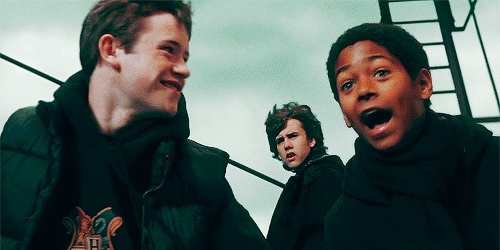
#and that person... is seamus#joking but not really#dean thomas#meta#beasts#this was super fun to think about thank you!#dean thomas supremacy#ginny weasley
193 notes
·
View notes
Photo
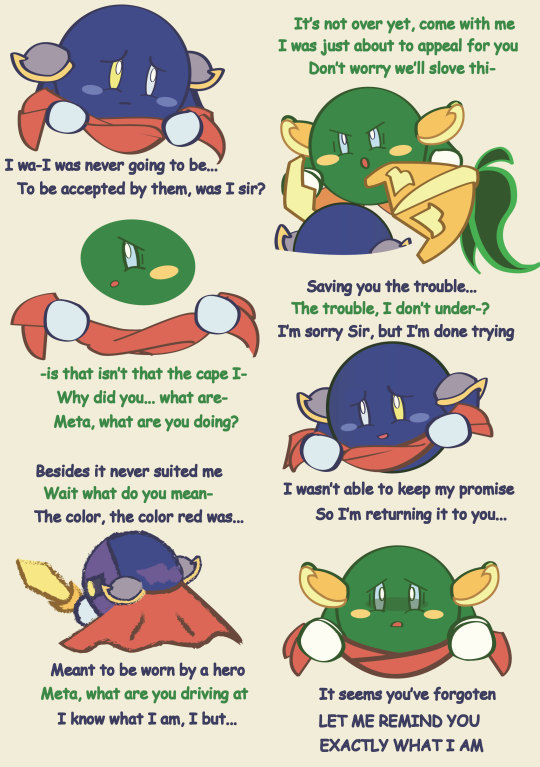
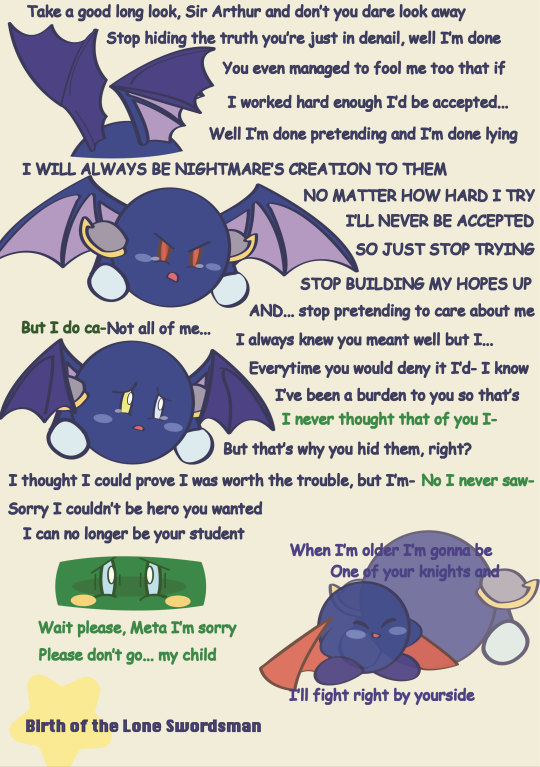
Birth of the Lone Swordsman
Scenario: Meta Knight passes his exam to become a Star Warrior but is rejected in joining the Holy Knights (A.K.A Knight of the Round table). Arthur claims BS that his student wasn’t allowed to join his squadron by the Ancients and elite but Meta has made up his mind.
I tried to give the comic an old flash back feel sorry if colors look weird. listen to “ I will make you proud” from tangle the series for emotional effect to fit the theme...
Yeah I know I keep writing MK Angst Kirby ain’t happy either.... (reaction at the bottom/ lore explanation at the bottom.
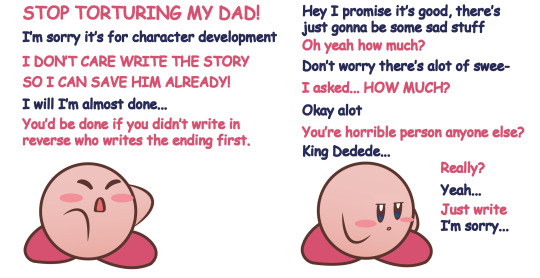
In the story, I gave a prelude to MK’s past of almost getting killed the moment he was born, because he was born from the fountain of dreams without a warpstar but they find out later that he came from N.M.E which MK was his first attempt in destroying the Fountain of Dreams. When MK didn’t obey Nightmare he sent him through the fountain as a living bomb and was supposed to be dead on arrival. The Ancients and other Star Warriors saw this and were going to kill him off N.M.E’s mistake.
But one lone Star Warrior seeing that he was a young boy stood up for him and plead for his life, Sir Arthur. The leader was someone else at the time Sir Uther (an OC who I will introduce into the story). He was one of the four legendary warriors and was the first winged astrals to be birth from the fountain of dreams. His persona is based off the Uther from Merlin the T.V. series (which was my fav. show back then) And if you watch you know that he’s basically the @sswhole of the series basically just replace his hatred of magic with N.M.E and we have yourself the corrupt leader of the GSA. But unlike in the series he is not Arthur's father but his mentor and when he stepped up to defend Meta he was pissed.
He straight up told him that if MK turns corrupted or a traitor he’d kill him personally. The Ancients agree to this and assigned him guardianship of MK... which was a first. Usually when a puffball is born education is done by the Ancients (MK wasn’t a baby like Kirby I’d say preteen) and are assigned a senior knight when they are ready. But none of them wanted to raise him since his birth did not come from Void so it was solely up to Arthur.
Little MK was still shivering when he was out of the fountain, so the red cape was what Arthur wrapped around him to keep him warm. Unlike Uther who was strict and cruel to him when he was his protege; Arthur tried his best to be a good role model for MK. Though Uther influence was strong and to this day Arthur still fears him which is why he made sure to keep MK on the right path... unintentionally hurting him.
You see the whole time he was training MK he always would encourage him to just hide and conceal his wings. And when MK’s “dark powers” would peak he would immediately correct him (especially if Uther was watching) while he knew he meant well MK couldn’t help but feel a little hurt by his teacher’s action. But Arthur promised him that this was the right way to do it and if he continued they’d surely see that he was capable of being a great hero. And Arthur made sure to nourish and nurture that little hope in his heart to motivate him through the hardship. But unintentionally putting pressure on him to be the perfect soldier. (Similar to Tai Lung and Shifu) But instead, MK is fueled by a lack of self-worth to do better rather than out of pride like Tai Lung ...
MK already knew of the pressures that were on Arthur so not to burden him MK just kept quiet about his feelings. So what if his teacher winced a bit when his wings peaked out~. While his intentions were good his methods were not right. Still, MK adored his teacher and was extremely grateful to him. And promised him that “he’d grow up to be his right-hand man and fight right by his side.” He knew Arthur cared about him, but still felt upset he would ignore the other side of himself... This was also fueled by the fact that part of Arthur still feared Uther, but also wanted his old teacher’s approval (Uther is truly the worse).
Which got worse over time MK’s powers got stronger which made it more difficult to hide them. This brings us to this seen in the comic, MK takes is final exam he passes but the Ancients and the higher-ups don’t want MK to join the elites. During this time they were looking to make the next generation of legendary warriors which would be under Sir Arthur (basically Arthur’s knights of the round table). But they didn’t feel comfortable that the cursed star would represent them. So they passed him, MK was indeed a Star Warrior but his position was up in the air.
Arthur was ready to fight for him but MK had enough and the feelings he had bottled up all these years ago come out. (shout out to MK's old design) This was a very significant turning point that broke student and master. MK’s red cape while mismatched to him was supposed to be a symbol of hope for him; which was the intention Arthur meant to give... but to MK which became something he could never be. It breaks Arthur’s heart to realize how much he failed his boy... MK felt ashamed and thought he failed Arthur in turn.
He completely shut down being accepted by the higher up/ the Ancients and not wanting to trouble his teacher any longer... he continued on as “the Lone Swordsman” of the GSA. Basically acting as a bounty hunter doing sole missions... Eventually when the GSA started accepting drafts/volunteers.
These made up the front liners of the GSA (the first to be killed) which MK is tasked to train them, this becomes a blessing in disguise on both ends for this is where MK meets his first real friend Jerca and his future-found family. Hope nothing bad happens to them...
#Meta Knight#MK#metadad#kirby#Sir Arthur#sir arthur kirby#kirby right back at ya#Hoshi no Kaabii#kirby fanfic#fanlore#GSA#kirby of the stars#meta dad#sir uther
157 notes
·
View notes
Text
The Radical Act of Quitting (and Wilhelm)
This is a little more personal than my Young Royals metas normally are. It’s really one-half personal essay, one-half show analysis. It’s something of a spiritual successor to my post about radical acceptance and Simon’s arc in season 2. And it’s also about the reasons why I want Wilhelm to renounce the crown by the end of season 3. (I am stating that early, because I know many people disagree. Feel free to engage but please do so with kindness; a lot of this is quite vulnerable for me.)
I’m disabled. Specifically, I have a chronic condition that began in my early twenties, and slowly got worse and worse until I was finally diagnosed at 28. I’m 31 now, and I’ve had to grieve the person I once was many times over. I used to be a dancer, I used to be an adventurous eater, I used to love to travel. My chronic pain and restrictive medical diet have taken those things away from me, piece by piece. But the thing I mainly want to talk about right now is quitting my job. At the time of my diagnosis, I had worked at my job full time for three years. For a few years after my diagnosis, I tried to remain at my job part-time, because I loved it. I worked in the music industry, and I had the best team of coworkers. I had a great work/life balance, I was never stressed about work. I looked forward to each day in the office. When I went to events and had to introduce myself during an ice-breaker, I would usually include a fact about my job. I found a lot of my identity there. All of my work directly supported musicians, which was something I was very proud of.
So I tried very, very hard to hang on to my job. My company gave out these ridiculously heavy plaques for employees who had been at the company for 5 years, and I was determined to get one. But it was really hard. I could no longer type sitting up for more than a few minutes, so I did every day from my lap desk in bed. (This is still where I write all of my fic and meta!) I struggled to talk to customers on the phone while I was in pain. The office was closed because of the pandemic, but I would have had to work from home regardless because I couldn’t handle the commute. Every day was a slog. And my pain and fatigue weren’t getting better. In fact they were continuing to get worse as time went on. Finally, my five-year work anniversary arrived. I made it, but I felt like a runner barely stumbling over the finish line. It was the end of 2021. I talked with my friends and my therapist and my disability benefits lawyer. “I don’t think I can keep working,” I would say. And then I would cry, because the thought of letting go of this last part of my identity, when my illness had already taken so much, was so horrible.
After several months of deliberating and grieving, I quit. My boss begged me to reconsider (God bless him, honestly). Was there anything he could do to better accommodate my needs? Could I work a different schedule to let me sleep more? Could I work freelance on specific projects they really needed me on? I wanted to say yes so badly. But I knew. The longer I held on, the more I fought, the worse my health would become. And the worse my health would become, the more I would struggle with work. The joy I had felt during my first three years in that office had already drained away. I was fighting just to get through each day, and I didn’t want to fight anymore.
I recognize that having the resources and disability benefits to even consider quitting is a huge privilege. There are a lot of disabled and chronically ill folks who struggle through work at great detriment to their health because they can’t afford not to keep working. So I recognize how lucky I was to be able to quit. I am so grateful for that option, even as I mourn all the things I have lost.
In my meta about Simon, I talked about radical acceptance and how it has been my guiding light as a disabled person. Embracing radical acceptance means that I have done my best to accept what I can and cannot do, and what I can and cannot control, without judgment. I accepted that I needed to walk away from my job. But how was I supposed to define myself without it?
Capitalism defines most peoples’ self-identity, whether they realize it or not. We identify with our jobs, or with the “grind” culture, or with the moral goodness associated with working hard. But here I was, without a job. And I had my whole adult life ahead of me. I had to find a way to make a new identity outside of work.
Around this time, I started to gravitate towards stories where characters are faced with similar decisions, even if I didn’t realize it yet. And let me tell you, there aren’t many of them.
@bluedalahorse and I talk about this a lot. In our ultra-franchised world, the point of stories, even those that are supposedly about rebellions, is often to return characters to the status quo, so that the next movie/comic/episode can pick back up where the last one left off. And when there is a significant change in the status quo, it is usually because the characters worked, and pushed, and struggled to achieve that change. It’s very rare to see a story about someone who walked away from something that was harming them. It’s rarer still to find something that deals with the aftermath, as characters work to re-establish themselves.
I’ve found a lot of comfort in true stories of people leaving cults and high demand religions, and of queer people forced to leave their conservative families behind. In all of these cases, people are consciously abandoning a predominant belief system that is harming them, and have to start over as they craft their new sense of identity. (I am also queer, which adds an additional level of connection). Often people in these situations come to rely on their found family, a thing I have also found to be true in my own life.
I quit my job in between seasons 1 and 2 of Young Royals, and I don’t think I realized how many themes connected my experience to Wilhelm’s until I was watching season 2. Wilhelm is the protagonist of Young Royals, and his central dramatic question has always been: will he fulfill his duty as a royal? Or will he quit, and discover who he is beyond the system he was raised in? Simon is a huge part of this decision, obviously, but the question has never been strictly about Simon.
While I have no personal experience with the monarchy, I do know what it’s like to consider walking away from a role that you assumed you would fill for the rest of your life. I know what it’s like to think about quitting your job.
There’s so much pressure on Wilhelm to assume the role of perfect Crown Prince. He’s told constantly—by Kristina, by Jan-Olof, by the court-- that he can’t let his family or his country down by deviating from this role in any way.
This is a pretty common experience for people who are trying to quit something. They are told that they will let down those around them if they leave. People who are leaving high demand religions are told that they will not be able to enter heaven. Queer people in conservative families are told they can’t come out because “it would break [elderly relative]’s heart and kill them.” When I quit my job, I thought a lot about how I’d be letting down my coworkers and everyone who knew me as a hyper-competent career-driven person.(This included some of my doctors by the way, who expressed their disappointment in my failure to adhere to their idea of a “worthy” disabled person, i.e. someone who soldiered through the pain and continued to work. Some withdrew care because of this and honestly I will never forgive them). And maybe I was letting people down, and maybe ex-Mormons really will spend the afterlife in outer darkness, and maybe all the grandmas of queer people will be so upset that they kick the bucket when their grandkids come out. But ultimately, if your happiness or safety or well being depends on leaving, it doesn’t really matter. You have to do it anyway. You have to abandon the things that you can no longer carry. You have to discover who you are on the other side of religion, of the closet, of capitalism.
I think about this every time people in the fandom talk about how Wilhelm leaving the line of succession will create a constitutional crisis, or impact all of Sweden negatively. I am personally pretty anti-monarchist, but I honestly can’t even tell you if I think that Wilhelm removing himself from the line of succession would bring about the end of the Swedish monarchy or not. Honestly, I don’t really care. I care about Wilhelm. I want him to seek happiness, to search for the future that must live on the other side of this oppressive system he finds himself in. A constitutional crisis? That’s Kristina’s problem, that’s Jan-Olof’s problem, that’s the government’s problem. Radical acceptance means focusing on the things you can control, and Wilhelm can only control his own happiness.
When this issue gets debated, I often see people argue that Wilhelm is too young to make the decision to give up the throne. But the reality is that we ask teenagers to make decisions about their futures all the time. @bluedalahorse wrote a great piece of meta about that here. I love what she said so much I’m going to quote it directly:
Nonetheless, we ask teenagers of Sara and Wilhelm’s ages to think about decisions that affect their future all the time. We ask them to consider what career they’ll pursue or what university to attend. Teenagers who grow up in various denominations of Christianity consider whether they’re going to go through with Confirmation or sometimes Baptism. Other religions (ones where I can’t speak from as much personal experience) have various other rites of passage around this age, and various cultures have coming of age rituals. For some teens, they do these things willingly and with their whole heart, whereas for others, they do it to please their parents or families or for the social norms of it all.
And if Wilhelm is too young to decide to give up the throne, how can he be old enough to decide to keep it? Surely the decision to take on the governance of a country, even in a symbolic way, requires as much, if not more, maturity than the decision to pursue a less high-powered career elsewhere.
When people in the fandom claim that Wilhelm is too young to make this decision, I hear Kristina telling Wilhelm to wait until he’s 18 to come out, because only then will he be responsible enough to deal with the consequences. That’s a delaying tactic, and nothing more. People who don’t want you to leave will ask you to delay your decision over and over again, because they think that if they can kick the can down the road just a little farther, they’ll never have to lose you.
I also see people argue that Wilhelm isn’t qualified to make a decision because he doesn’t know enough about the “real world” to know what he is choosing. To be honest I don’t think most teenagers know much about the “real world”. I definitely didn’t. But we ask them to make decisions that will affect their futures anyway. And here’s another way to look at this: Wilhelm has plenty of places he can look to for examples of how “ordinary” people live. He can find out what it’s like to be from a noble but non-royal family from the students at Hillerska. He can talk to Simon and Linda about what their lives are like. He can read the millions of books, or watch the thousands of movies and TV shows that feature non-royal protagonists and were created by non-royal artists. But only Wilhelm knows what it is like to be Crown Prince. No one else has had that experience. So I would argue that actually, Wilhelm is the only one qualified to make this call.
Ultimately, the agency and mental capacity of people who are quitting is often doubted, usually by the people who have the most to gain by keeping them in place.
So many people have so much invested in maintaining the status quo. And as soon as you invest in a system, someone daring to leave puts your world view into question. Why are you dealing with so many oppressive rules if someone else can just leave? We see this a lot with high demand religions and cults; if someone threatens to break free, the members often join ranks and work together to pressure them to stay. What has your sacrifice as a woman in a patriarchal religion meant, for example, if another woman can decide to simply walk away? Does Kristina’s grim life of duty and sacrifice matter, if Wilhelm can just opt out and seek happiness instead?
Then of course, there are all the benefits that an oppressive system confers on its most privileged members. Those benefits are in danger of disappearing if enough people quit, so high ranking people will work to keep others in line. Think about all the people who benefit from the monarchy: all the staff who work for the royal family, all the nobles who get their reputation by proximity to the monarch, and everyone in Sweden who in general benefits from the image that a long-standing institution of white, straight, conservative power projects.
And those aren’t people Wilhelm needs to be responsible for (or should be concerned with placating, to be honest). If the monarchy fails because Wilhelm leaves, it’s because there’s always been a fault in the system. Those relying on this outdated system have signed their own fate.
No one knows fully what life will be like after they quit. That’s the radical acceptance part of quitting. You have to make a blind leap, and discover a whole new world once you land. Wilhelm is no more sheltered than anyone before they take this leap. Everyone who quits—a religion, a cult, a job—has to go through this process of rediscovery. You have to learn by doing. People do that successfully all the time, and I believe that Wilhelm can too.
When I was talking about this meta with @bluedalahorse, we talked a lot about Plato’s allegory of the cave. That story goes something like this:
Several prisoners have been kept inside a cave their entire life. They are chained to the spot, and cannot move. They are facing the back wall of the cave. Behind them is a fire, and in between them and the fire, their captors walk back and forth, casting shadows on the wall. Because the prisoners have been kept in the cave their entire life and have only ever seen shadows, they think the shadows are real. They think the only thing that exists in the world is shadows. Until one day, one of the prisoners is set free. He goes outside for the first time, where he is blinded by the sun and overwhelmed by stimulus. But he discovers the real world. He now knows that the shadows he was used to are pale imitations of the real things. He’s so excited that he goes back to tell his fellow prisoners what he has learned. But the prisoners get angry at him for challenging their world view. They don’t believe him, no matter what he says.
There are a lot of ways you can interpret this story. Some people think that Plato is talking about the role of philosophers in society. Some people use it to explain a philosophical concept he writes about elsewhere called “forms”. But I think one thing is clear. Plato didn’t write the allegory of the cave (and it didn’t stick around in human imagination for thousands of years) because he thought you should stay in the cave. Leaving the cave is hard. You will be met with resistance. But discovering the real world, when you were only seeing shadows before, is worth it.
I want Wilhelm to leave to be happy, to see the real world instead of shadows. But I also believe it’s what the story demands. It’s the only answer that makes asking the dramatic question—should Wilhelm conform or rebel?—worthwhile to me.
To be king, but to be the first gay king, would be such an unsatisfactory ending for me. It reminds me of how hard I tried to keep my job—by working from bed, by reducing my hours. My boss could do the best he could to be accommodating, but ultimately working was harming me. You can’t adapt the monarchy enough to make it a non-damaging space for Wilhelm, because there will always be people pressuring him to conform to its straight, stoic ideals. Those ideals have been around for hundreds of years, and to put all of the burden of reforming them on Wilhelm is unfair and unrealistic. If he does stay, I see him struggling to change a system that is not designed for him. Even if he does make small victories for representation or inclusion in that context, it will come at an enormous emotional cost. I just don’t think it’s worth it. Not when there’s a whole world where Wilhelm could be doing good, important work– in whatever arena he chooses– that won’t also come along with inherent emotional trauma.
Believe me, there’s a whole world to be discovered after you walk away from something that’s damaging you. You grieve, yes, but you also grow. Since quitting I’ve been able to love my friends harder, to treat myself better, to give back to the disabled community. I think if you talk to most people who have committed a similar act of radical quitting they’ll say the same thing. I want this future for Wilhelm, but I also want this kind of story to exist for all of us. I want there to be a story that represents those of us who have had to make these kinds of decisions. I want there to be a story that can encourage people who are currently wrestling with their desire to leave and the pressure to stay. And I want there to be a story that shows the hope, the bravery, and the self-belief that is required to walk away and seek a brighter future.
#young royals#prince wilhelm#wilhelm young royals#my meta#my crip media reviews#this turned out to be very long thank you if you read it all
83 notes
·
View notes
Text
Mary Jane and Frankenstein
In honor of Spooky Month and the imminent arrival of Mary Jane Day, I have done the scariest thing imaginable, returned to tumblr dot com to write a meta/analysis post.
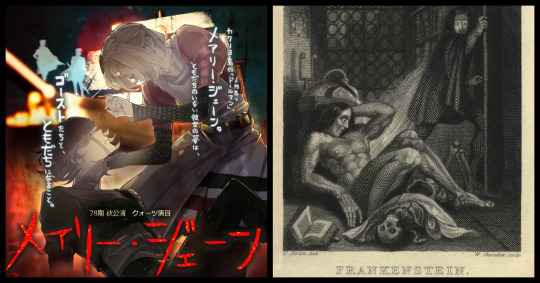
[image description: images side by side of the top of the Mary Jane poster, showing Mary looking down sewing Jacob, next to the 1831 edition front panel illustration of Frankenstein, showing Victor looking down on his creature in horror]
This is a mostly informal attempt to collect my thoughts on the fact that Neji’s little spooktacular, in addition to being a very pointed exploration, as all of his plays are, of art and theater, the school, himself and his classmates (without their permission, the menace) and just, a lot of fun, is perhaps one of the best piece of Frankenstein related media I have EVER seen in relation to the original novel.
This is pulling a lot of things from the Stage Script rather than the in game version, which summarizes a lot of the things I'm mentioning specifically. You can find the full Stage Script in the game menu, or
[ here ]
because I love this play so much that I needed a searchable version.
Caveat Emptor here is that it’s been a long time since I’ve read the novel in its entirety. If this game gets me to read it again, I may have to revamp things. But again, largely informal. But very long, somehow.
Oooops.
If you're curious about anything in here and want to expand on it more, or hear my thoughts on it, please feel free to reblog, send an ask, or message. Or ask me elsewhere if we're already connected there. There's a lot I glossed over, especially at the end of this. I have a lot to say, and if we're back to writing metas on tumblr dot com the chances of stopping at one are slim.
Mary as Frankenstein, Mary as Mother
Mary’s name is acting as several allusions at once. I mean, there are at least 3 Mary’s in the bible one could point to - Mary, Mother of Jesus is absolutely at play. But Lazarus’s sister is also a Mary. And while technically Mary Magdalene is often misrepresented and amalgamated with other characters in retellings, the idea of “purifying” her has canon precedent - having had seven demons driven out of her.
Of course, Neji’s twisting all of it, in his Neji way.
(Interestingly enough, these are the Three Marys of the Quem Quaeritis - widely considered a point of "rebirth" of theatre in Europe during the middle ages.)
But Mary is also the name of Mary Wollstonecraft Shelley, author of Frankenstein. And this, this is a Frankenstein story. It is, in fact, a beautiful inversion of so much about the book that gets left out in most far more serious attempts at a Frankenstein story.
The original book is about motherhood and its inversion. Much could be said about when during her life she wrote it, or her own mother’s death shortly after she was born, or any number of things that have been hashed and rehashed a thousand times from AP English to the ivoriest of towers. But, fan of Death of the Author that I am, I posit you don’t need any of that to see in the text.
Victor creates a person with science, rather than by ‘nature’. It is an unnatural birth. And Victor is just about the shittiest possible parent. The Creature spends a good deal of time explaining to him, when they meet up again, that Victor is his father, and that he was literally abandoned as a newborn, and maybe that was kind of the worst possible thing he could have done. It’s not a mantle Victor has any desire to take up, the role of a parent. He wanted to create life, but he didn’t want to be a parent. But that’s what it means to create life.
By gender swapping the role, you’re already inverting the inversion - but Mary’s creation is no more “natural” than Victors. But it is different. Neji, ever witch-coded himself, has Mary put one of her own hairs into every doll. It’s returning the shared body to the act of bringing these creations into being.
But even without that. Mary considers herself a mother. She considers herself a mother despite having no memory of one herself - Mary knows lots of things she shouldn’t, and doesn’t know many things she should. But she calls herself a mother. Even before any of the dolls move, she is their mother. A motherhood she wants to desperately share with others. She considers the act of selling a doll a kind of ‘adoption’. These are her children. And they know it. It’s stitched into every stitch in their doll bodies. They know Mary is their mother. And they know she loves them.
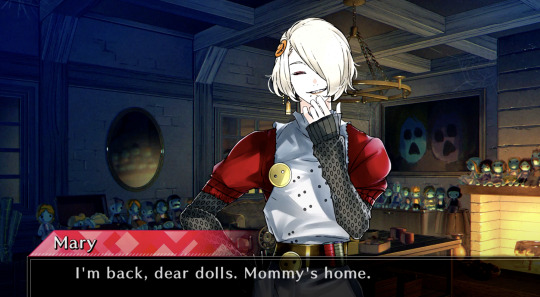
[image description: screenshot of Mary in her workshop. The text shows Mary's line saying "I'm back, dear dolls. Mommy's home."]
The Creature comes to think of Victor as a father - an absentee one at that, and craves that love, a love he is never shown. Mary averts this spectacularly. She creates out of love.
Names
Mary takes great care in naming Jacob, and ends up doing so, though she doesn’t say it, after a biblical pun (Jacob, in the bible, is explicitly named such as a pun on the word “Heel”). But names are important to Mary, and she is sure to give one to Jacob as soon as he’s fully formed, even before she sees him wake up. Victor very particularly does not name his creature. Instead, he tends to throw around insults, many of which are demonic or satanic. When they finally meet again, the Creature says to him “I should have been thy Adam.” Mary averts this mistake, among so many others, spectacularly. Being called by her name is important to her, and she extends that offer to Jacob even before he’s fully “born.” Like a good mother.
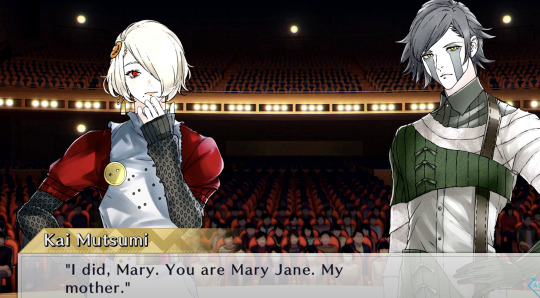
[image description: a screenshot showing Fumi and Kai dressed as Mary and Jacob, as seen from the stage with the audience in the background. Kai is saying Jacob's line "I did, Mary. You are Mary Jane. My mother."]
Not only does she give him a nice biblical pun of a first name, she shares her last name with him, again before he’s even more than a doll. That’s her boy, that’s her best friend. That’s her family.
The song here, which is only sung and dance AFTER Mary has given him a name is called "A Friend Without A Name" Almost as if specifically calling attention to this fact. Mary is as much the friend without a name as Jacob, if not more. She is the one that has never heard another voice say her name, where as Jacob is called his before he's even awakened by the Island's magic and Mary's love.
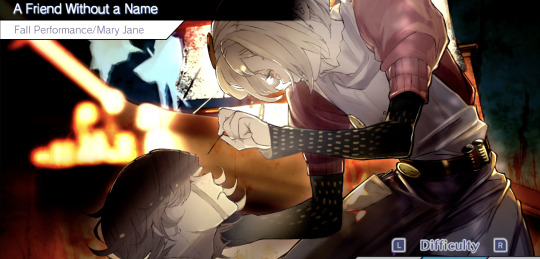
[image description: the screen from just before A Friend Without A Name showing Mary and Jacob's CG of Mary Stitching Jacob.]
Mary as a Good Mother
Some of the weirder moments in the play actually make a lot more sense when you look at them through this light. Jacob randomly saying he hates Mary in a fit of jealousy? It’s because he’s a child. He’s a baby. That’s a baby boy. Mary, herself quite childish, forgetting so much of what’s important, as the Island is known for, reacts incorrectly, but understandably. This is her first friend - and far more of one than the others she thinks she’s made, in terms of mutual respect, compassion, and small acts of kindness. But this level of connection and emotional reciprocation is still new to her. She’s hurt. She runs.
And The Order of Shadow’s duo is quick to tell her that that’s just the nature of ghosts, telling themselves a little joke about how they have been lying to her from the start, and fully intend to stab her in the back, far more than any ghost. Victor’s instinct is to consider his creature a monster, a fiend, a demon. Mary is told by characters positioned as far more knowledgeable about the world than her that he must be exactly that.
And how does Mary react? She refuses to believe it. Even hurt as she was, even with someone who just said this is their entire expertise telling her it’s in his nature to be cruel, Mary refuses to accept it. She still loves him. She makes the right choice. That’s her best friend. That’s her family. That’s a (un)life she brought into this world, and she stands by him. No matter what. She would risk her life to rescue him. She will fight for him.
This is why that scene has to be there. Because she has to be given that temptation, that trial. And she passes spectacularly in a way Victor will not, to the end.
It’s also a thematic explanation for the garbage scene, which is probably there as much to be silly as anything. I mean, it’s also there to show many other things — Mary’s eccentricity is ingenious in its own quirky way — the islanders who hated her, who she didn’t understand, give her the tools to save Jacob and the others — Mary not even considering the same level of violence — it being a moment of empathy between Mary and the islanders who never showed her even a shred of it back — she understands that they couldn’t tell which food was rotten. She sees things from their point of view. And many more besides.
But, from the point of view of Mary as a Mother, Mary succeeding brilliantly where Victor failed… Mary is literally willing to coat herself in filth to rescue Jacob. Parenthood is messy. It involves a lot of gross things. Even Victor's, sanitized of the normal processes and cloaked in science, was made of corpse parts. But the play actually brings back a part of parenthood that Mary had been able to avoid thus far - the mess. Mary, once again, doesn’t hesitate. For Jacob? She’ll do anything.
Jacob is shown love and kindness, and he responds with the same. He has the same unnatural strength as Victor’s creature, but he’s only ever shown using it to rescue himself and others. When Mary asks for a handshake, he replies that he can’t, because such would be an invitation for a duel. And that they should hug, instead. Mary didn’t even know what that was. Far from disgusted by the lack of warmth she feels from his skin, she looks beyond that, to the emotional warmth and connection.
Frankenstein’s creature, famously, lashes out in violence. While Victor views this as his responsibility only in so far as he brought a demon into the world, he doesn’t understand, even when the Creature eloquently explains it, that the Creature was a being who had only known cruelty.
Jacob knows love. He knows kindness. He knows sadness and loneliness and pain. And refuses to engage in any form of touch that could even be considered violence. They hug.
Which is not to say Mary’s creatures can’t kill. But they do only to protect their mother, and only after Mary has risked everything to protect Jacob. They are Mary’s children, not Victor’s. Even their violence is an act of love.
And in another inversion - they are the ones telling Mary to run. Something she does not want to do. She doesn't want to leave them behind. After all, they are her children. She departs from them only at Jacob's literal tug away, and with an apology and a thanks.
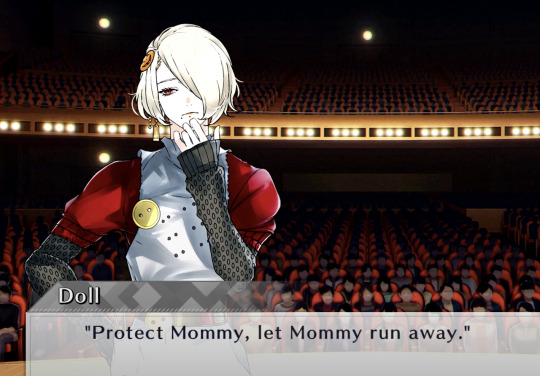
[Image description: screenshot of Fumi, dressed as Mary Jane, shown from stage view, with the audience behind, while a Doll's lines "Protect Mommy, let mommy run away." are shown below.]
Boats and Framing
But the parallels are not only in the most famous part of the novel - consider this - Frankenstein, the novel, is written as a series of nesting framing narratives. The bookend narrative, the one we open and close on, is a boat. Most Frankenstein adaptations cut the boat trip frame, but Mary Jane very specifically opens and closes on a boat at sea, and its ending is EXACTLY the reverse of Frankenstein’s. If for some reason you’re this far in and don’t want more spoilers for a 200 year old book, now’s the time to click away, I guess.
The boat is on a course to the Arctic. Victor is on board, telling his story, because his creature has fled there, away from humanity. Victor intends to pursue him endlessly, to kill him, fully aware that he is almost certainly going to die, frozen and alone, in the process. We don’t get to see this happen - the story ends merely with the certainty that this is what is coming. Victor, on a boat, intending to go to the ends of the earth alone to kill the Creature he brought into the world, treating it like some burden and punishment.

[image description: a screenshot from Mary Jane, with the CG of Mary and the Ghosts on the ship, with the summary text overlayed on it reading "Friends together, fun forever."]
How does Mary Jane end? With Mary, and Jacob, and a cast of playful characters — her friends — sailing off for the ends of the world, together, in pursuit of life and happiness - even in death.
Ghost Party ends the play because its a triumph. Neji throwing out Horace’s Ode to Cleopatra in there because he can’t not do silly things like that — but Frankenstein famously contains many references to classics — many made by the Creature himself, who was forced to educate himself via books, lacking a parent to help him.
Mary Jane takes a section of sheer joy out of a poem of complex mixed emotions, and says them repeatedly. This is a party. This is a triumph. Mary leaves on a boat for the ends of the world a success, a good mother, a friend. And a human.
Humanity, Connection, Isolation
The play deconstructs so wonderfully this question of humanity. Mary doesn’t find any joy in it, despite barely understanding it herself - until she is able to use it to help others. The first time in her life she’s been glad to be human - something she only really understands as “needing to eat food” - is when it gives her the ability to save her ghost friends. If that’s what humanity is, the ability to care for others, the ghosts of the chapel, the play is telling us, are far more human.
One of my favorite exchanges in the play is after Charles and Figaro explain to Mary that the corpse parts used to make Jacob were their friends. Mary is not malicious in the least. She has no concept of this act as sacrilege or desecration. She is genuinely childishly innocent in most of what she does. And she can’t understand it.
Mary says “If you can love unmoving corpses so much… How can you not feel for living ghosts...?"
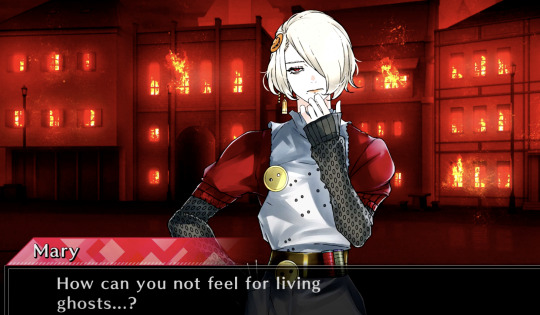
[image description: Mary in front of the burning town. She's saying "How can you not feel for living ghosts...?"]
Charles responds that she must be completely off her rocker. But she’s correct. Mary sees life in front of her, even undead life, and wants to protect it. Even the Islanders, who only ever treated her with distain, who only ever made her miserable — she doesn’t want them to die, even knowing they are already dead.
Outside of Mary, her oddball eccentric self, in this play, the more human someone is, the crueler they are. Figaro and Charles are only ever here to mess with her before dragging her off to be killed. They have no willingness to even try to understand anything outside their world view. The Islanders, who think themselves human, revile Mary, and make up terrible rumors about her.
Both of these groups do so, in part, for similar reasons. Because to have empathy would force a realization on them they cannot bear. The last thing Figaro realizes, before he’s dragged into the most poetic of justices, is that the dolls have SOULS. They are ALIVE. It’s a moment of anger and madness, but it’s a last minute realization that he’s been wrong now that it’s too late. Of course it’s not a revelation he’ll remember. You tend to forget what’s important on Kakuriyo Island.
If Mary averts all of Victor’s mistakes, Charles and Figaro make many of them. Seeing the Creature as a collection of corpses, as demonic, as an abomination against God. Reacting only in anger, in cruelty, in violence. Chasing something they view, wrongly, as an abomination to the ends of the earth, until it kills them. Mary has Victor’s role, but Victor’s actions and outlook are given to the antagonists.
It’s fascinating to me, then, that there are two of them. In the version of the play that gets performed, they’re twins - doubles. Two halves of one whole, who egg each other along in their cruelty. But they also exist to show that even these two are capable of empathy and connection. They do in fact understand the thing they tease Mary with. They have the ability and understanding to extend that to Ghosts, or to Mary. They simply refuse to. Figaro really does love his brother - his grief at his death is genuine. It’s a clever way to show that.
In the book, Victor is extremely isolated, by his own choice. He withdraws from everyone in order to work on his creature, and after he runs from it, he keeps to himself just as much, now blaming the idea that he can tell no one what he’s done. Even when he’s surrounded by family, he is utterly alone. By choice. The Creature eventually lashes out and kills the woman Victor intended to marry. In Victor’s mind, he cares about this girl, but it is not in his actions. Like much else, she exists more as a creation of Victors mind than something in the world for him to interact with and care about. Until she dies. Then he’s furious. And decides to spend the rest of his life chasing down the Creature to kill him for it.
This contradiction in Victor has always read as intentional to me. The book is calling out his hypocrisy here. He doesn’t actually desire connection - the connection his Creature eloquently explains his longing for. But if it is denied him, he acts like he’s been affronted, painted with a shallow layer of sanctimoniousness or justice. Murder is bad, of course, and the Creature shouldn’t have killed an innocent young woman to get at Victor, of course. But the discrepancy between the way Victor reacts to her in death and the way he does when she’s alive is intentional.
Victor has every chance for human connection. Time and time and time again he’s given that chance and refuses it. Even to the very end, on that boat. He could stay with the crew. Sail back home. Let it go. The Creature has run away from humanity which it has come to despise as much as its absentee father disdained it. There is no need to keep chasing. But Victor cannot let it go.
The Creature longs for connection and is denied it. Victor disdains and refuses it, even when it’s available to him.
Mary as The Creature
Contrast this with Mary — It is Mary, rather than Jacob, that is in the Creature’s situation here. Mary is constantly chasing connection. Constantly trying to find something to reflect humanity (compassion, life, emotions — rather than the matter of blood and flesh that Figaro and Charles always talk about it as) back at her. And she can’t get it. She, like the Creature, hides in the bushes and watches it from afar. She, like the Creature, chases after it only for people to run away, to treat her with cruelty. Mary is Frankenstein, but she is also a reflection of the Creature. She is both in one, in this sense.
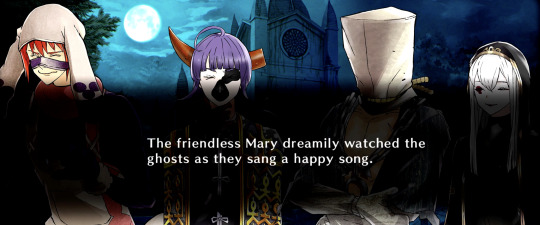
[image description: screenshot of summary text over the church and figures of the church ghosts. it reads "The friendless Mary dreamily watched the ghosts as they sang a happy song.]
Her costume specifically makes her look nearly as much the doll as the ones she makes - in the world of the story, because she's sewing both - but thematically, it ties her to them not only as their mother, but as a reflection of the Creature, herself.
Like the Creature, Mary is an odd mix of naivety and childishness, with startling gaps in her knowledge, and extreme skill and adult abilities. She knows what she knows well. Like the Creature, Mary has no memory of kindness, of family, of parents. She has only ever seen it in the way the Islanders interact with each other. She is the Creature here - raising herself, learning of the world through watching it, being reviled for every attempt she makes to reach out.
One thing the Creature explains to Victor is that he didn’t even understand, at the time, why he was being treated this way. He had no awareness of his own nature and what he looked like in the eyes of others. Only that they ran in fear and chased him away, and reacted with violence.
Mary Jane inverts this. Mary is human, but the humans around her are something she cannot understand. Like the Creature, Mary doesn’t understand why people react this way. The book expects you to come to the same conclusion as the play - the fault lies not with the Creature anymore more than it does with Mary, at this point. It is those around him, those around her, that are at fault, that are a thing neither can understand. Human’s are cruel. Ghosts who think they’re humans are cruel. It is a disconnect between themselves and the world around them they don’t understand, and desperately try to bridge over and over.
Even Mary, as quirky and childlike as she is, is on the verge of giving up, of being consumed by the Lonely Darkness. We don't know what her fate would have been if the Order of Shadows had not come. Victor's Creature, far more morose than Mary, gives up on connection, as well. He is denied the most basic of needs, and eventually, he learns the violence and hatred being directed at him, and, newborn that he is, lashes out.
But, ultimately, companionship and connection are the Creature’s goals, and it is that that he requests of Victor, who refuses to provide it himself. Make for me a mate. Mary is the Creature, and she is Frankenstein. She makes a friend for herself. Her motivation in creating Jacob is not science, it is not in defiance of death or God — very pointedly — it is out of loneliness - the same motivation that the Creature gives for his desire that Victor make him another like him. And when Mary does so, she’s a good mother, and a good friend.
Religion
Frankenstein’s full title is Frankenstein; or, The Modern Prometheus - it is about forming people, but it is also about stealing fire from the Gods. The question of if creating life out of death the way Victor does is an affront to God is something that Victor himself thinks about, but the book is much more interested in exploring it as the way characters view it. Victor punishes himself, it is not the Divine that punishes him. The Divine acts not as a force, but as an idea. One that both Victor and the Creature end up grappling with and trying to find their place within.
So that Mary herself seemingly has no concept of it, is fascinating. She goes to watch a chapel every night, but I don’t know she knows what a chapel even is. She mentions God once herself, saying that the smell of the garbage would be enough to affect even God, but she also talks to the Moon as a companion and a friend. Her worldview is uniquely hers, in relation to all things. As I said, the idea that making the dolls the way she does, or using corpse parts to do it might be sacrilege does not even occur to her.
Rather than go the route of the novel, Mary Jane twists this around too. In the world of Mary Jane, religious objects hold not only the power of an idea but an actual force. And it is a force that is completely, within the world of the show, amoral and nonsensical. The blessed weapons and fire the Order of the Shadows use are “holy” as a property, but that gives it no moral weight within the world of the play. And the play is messing with it the whole time. Holy wood or water can destroy a ghost, but they live in a church. Something that Charles and Figaro comment on, but cannot interrogate in terms of what it means for their conviction. But they’re split on how to proceed - the fact that ghosts can live in it doesn’t shake their faith, though. Sister Ghost is there largely for this joke. A nun who is constantly evoking the divine, who would be killed by a consecrated item.
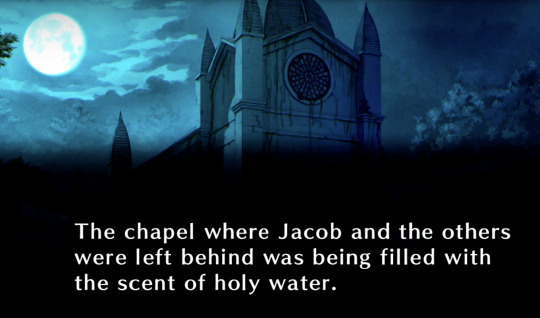
[image description: the summary text over the chapel backdrop with the text of "the chapel where Jacob and the others were left behind was being filled with the scent of holy water.]
If I could add something to Mary Jane, I would have loved for Mary or Jacob to ask Sister Ghost what “God” means (this is a conversation that happens in bonus material for Tokyo Ghoul once, actually). I would have loved to have that brought up more explicitly. But it’s also very funny that it never is.
The first definitions for a God we get are them being applied to Mary herself, with plenty of ambiguity on if the Order’s faith itself has a mother figure at its center or not. And either way it’s a fascinating play on the idea, and the themes of the novel.
Closing Thoughts, Other Connections and Ideas "Beyond the Scope of this Essay"
Anyway, all of this while playing around with everything else going on in this play, Neji’s totally, without permission, commentary on Fumi, on Tsuki’s legacy (please read the stage script, somehow the game thought it was a good idea to cut that whole specific reference even when making Kisa pick between an “erase Tsuki” option) and on Kai. On himself as an artist. ("I am the one who is strange. With my changing moods, with my hobbies. That is why everyone thinks I'm strange and avoids me.”). As with several other plays, a commentary on authority, and on creation, and on isolation and friendship and connection.
And, of course, what I’ve been holding back this whole little essay is that Mary Jane is, thematically, at its core, playing off the exact same situation as I Am Death. Like — both of these plays center around a woman pouring her emotions into an undead creature. I see you Neji. You can’t hide from me. Reading I Am Death as a Frankenstein Story remixed into an old Japanese mytho-history is a LOT of fun to do, but is, as the academics say, beyond the scope of this essay.
(and, I Am Death itself is about Neji and Chui, and the twisted, messy love-hate revenge drama they are acting out across all the routes in the game. Neji writes the plays that introduce Chui to the world. Then he runs. And spends the whole game trying to beat him (affectionate.). “Make me another like me” you say…
Literally the only thing I’ve come up with to make the “bad end” CG more compelling to me, is that this is what it’s riffing on. I like my I Am Death costumes way weirder.)
Mary Jane is a Frankenstein Story, I Am Death is a Frankenstein Story, Jack Jeanne is a Frankenstein Story.
The other, other thing I’m leaving out here is that the Order of the Shadows are OBVIOUSLY pulled from Tokyo Grand Guignol, aesthetically. And the most famous TGG play is Litchi Hikari Club, which is, say it with me, a Frankenstein Story. Also one that takes the themes of the novel (gender, love and sexuality, childhood, genius, violence, blind pursuit to the point of madness, god complexes) harder than most, but runs with it in nearly the exact opposite direction. But again, very much beyond the scope of this essay.
Also also also leaving out the fact that Tokyo Ghoul is... kind of ... not not a Frankenstein story. It certainly riffs on the motif quite a bit. Even if you've never read it, you've seen the mask design (an in universe riff on the joke.).
Even just one dimension of this play, and look how many words you've made me write Neji-senpai.
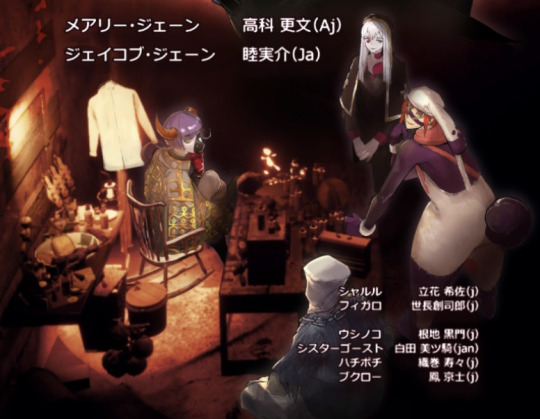
[image description: image from the bottom of the Mary Jane poster, with the cast list, showing the chapel ghosts with a focus on Ushinoko, Neji's character, looking towards the 'camera'.]
Some little Halloween Spooktacular you’ve got there. Bravo.
#jack jeanne meta#jack jeanne#Mary Jane#frankenstein#lit crit#doing lit crit of stories within stories - what a trip#meta
46 notes
·
View notes
Text
Sorry I like... have to write a Buck meta right now:
He's just...he's so unsure of himself, and hides it behind that macho bravado that gets him through everything, that makes sure no one asks any questions.
He's used to people telling him that he's selfish or reckless or "makes things about him." But it's like they don't see, and therefore he doesn't see, that he might be the most kind and giving person in the entire show.
Like, let's just take a look at just a couple of the most recent examples in my watch:
Christmas. He knew that Eddie was upset that he couldn't spend Christmas with Chris, and he knew that Chris was upset and feeling like he was going to be alone on Christmas (asking Buck if he could spend Christmas with him). So he gets together with Athena and coordinates an entire surprise thing so that the whole crew can spend Christmas with their families. He coordinates Christmas dinner because that was the only thing he wanted, He pulled down mistletoe just to kiss Hen on the cheek. He spends the day with Chris because that was what he wanted.
Red. He meets Red in a bar, finds an affinity with him immediately, and he tries to better his situation. Sure, taking him to see Cindy was a mistake, but he was just trying to do right by him, make sure that he didn't feel so lonely. And then, in the end, when Red tells him that he has mesothelioma, that he can't be saved, that Buck is 40 years too late, he calls what looks like every firefighter he knows and has him sit in the captain's chair to be taken home to pass away at peace, without feeling so alone.
And Chris. Everything about Chris. How hard he fought to find Chris during the tsunami, how easy it is for him to hang out with Chris, do things with Chris, make Chris feel like the superstar he is. Buck, who we never see interact with kids before Chris arrives, takes to him immediately, and becomes one of the most trusted adults in his life. "His Buck."
It's like no one sees this. It's like they just see the class clown and the reckless young firefighter, but the don't see how vulnerable he is and how tightly he clings to the people he loves. How he screamed and sobbed and dug at the dirt to try and get Eddie out, how he fought to get to Maddie when she was kidnapped by Doug and when the dispatch station was taken. How worried he was about Bobby when he was exposed to the radiation and Hen when she was working through the accident and Chim when he was stabbed.
They are his family, and sometimes it's like they don't see how much he needs them. Yes he tries to hide it but you can almost see him white knuckling every relationship in his life because he's terrified it's going to go away.
He's so kind, so generous with his love and his heart, and I just want someone to give that back to him, to love him as unconditionally as he loves the rest of them, and for them to show him that, to really show him that they'll be there for him no matter what. Maddie does, of course, but someone who can put him first, prioritize him, not let "life happen" and him to be pushed to the side.
I've made my silly little shitposts about how he's cementing himself as a forever character, but he's truly carved himself onto my heart, what an incredible and deeply complex character that Oliver Stark has created, and I can't wait to see the rest of his journey.
#evan buckley#911#my meta#liveblog#dusting off the meta tag for the new boy#911 abc#911 fox#buck buckley
11 notes
·
View notes
Text
First watch: Last Twilight episode 6: the kisses and the just in time eavesdrops
I haven't been moved to write much about Last Twilight. Part of this I attribute to my being scrambled by trying to watch too many series a week at a time at once. Part of this is, although I love this series, I'm kind of letting it wash over me rather than trying to analyze it.
But after watching all the kissing that happened in episode 6, I'm moved to write about that. Also that there was way too much coincidental eavesdropping for my taste. Deets (and spoilers) after the jump.
Okay, big spoiler: we were expecting August to be a competitor for Day's affection. In episode 5, he was grabbing hold of Day's hand. But then, he stood Day up for a dinner date and eventually showed up just in time to hear Day declare to Mohk Day's attraction to August. (Eavesdrop #1). August looks at Mohk and shakes his head "no."
This puts Mohk in a dilemma: does he out August's presence to Day, who can't see August or not. Mohk goes with staying silent.
August kissing Day
But the very next day August shows up at Day's with a story about having collapsed and injured his wrist and needing to go to the hospital. I rewound and confirmed that when August showed up the night before, he did have the wrist support, so it was feasibly a true story. (Well, this is all fiction, of course, but within the fiction it was likely true.) But August takes Day out running and has Mohk arrange to see that Day gets to a surprise birthday party. And at the end of the party, August plants a big kiss on Day, which Mohk arrives just in time to see (Eavesdrop #2, a visual eavesdrop).
Like I said, too many chance overhearing/seeings.
Actor kissing meta
So, time to go into a meta discussion of stage kissing. Here we have an actor, Ohm Thipakorn, doing a stage kiss of a character, August, doing what is in essence a stage kiss. So Ohm has to act the character August doing what an actor would do to be able to kiss another actor.
Generally, by the time we see a kiss, actors have rehearsed how they're going to kiss, probably multiple times, so that they can give a convincing performance in the absence of actual attraction. Ohm would have rehearsed this kiss with Sea, but August has not rehearsed this kiss with Day, so I would have expected the kiss to be more awkward. But that depends on how comfortable August was with the deception.
If it was intended to be a deception. Maybe August really was trying to stir up an attraction for Day. Or maybe August has had enough experience with kissing that this is just one more kiss for him and no big deal.
Day kissing August
So Day kisses August back. Intently. This is too much for August, and August separates. Mohk confronts August and August confesses (not in the QL sense) that he can only think of Day as a friend. As if Day isn't standing right there. As Day said in an earlier episode, Day's blind, not deaf.
Mhok and Day retreat from the restaurant, and Mhok takes Day to a rooftop. (Hi Khun Aof!)
Mhok kissing Day
And on that roof Mhok kisses Day. I'd call this kiss dubcon. Day can't see the kiss coming, can't hear the kiss, hasn't invited it.
I don't expect perfect behavior on the part of characters. I like portrayal of complex and flawed individuals. We already know Mhok can act on impulse.
I do expect dubcon and noncon behavior in series to have dramatic consequences of some sort, and we get that. Day is already coming out of the evening feeling pitied, something that he's made clear from the first episode that he can't stand, and the very thing that resulted in Day's insistence that Mohk be his caretaker was that Mohk didn't pity him.
But now with this kiss, Day is questioning his trust that Mhok doesn't pity him. He asks Mhok "Do you pity me?"
There is no safe answer for Mohk to give. We know Mohk was jealous of August. We saw that. Day can't see, so has no idea.
Mohk's not going to say "yes," because he doesn't pity Day.
But if he says "no," it's going to be hard for Day to trust that the answer is true, not after all that's happened today.
Mhok and Day kissing
So Mhok gives the only unambiguous answer he believes he can give. He kisses Day again, more intently. And Day takes this as the genuine interest we as audience members believe it to be and not as pity, and kisses back.
So, one episode later than the kiss in Bad Buddy, with six more episodes to go.
#last twilight meta#last twilight series#last twilight the series#last twilight#yaoi#thai ql#thai bl#pandasmagorica#kissing#consent#rooftop kiss
13 notes
·
View notes
Note
What about Terry and Mike in the OT3? are they a thing to or do they only agree to share Daniel?
My boy always gets sidelined, and this dynamic gets ignored even more than Labarnes, which is also criminally underrated. I get it, cause Mike and Terry spent most of their screentime separately and with Daniel, in kk3 and ck s5, and so we really don’t have much to go on, unfortunately. But I’m gonna go full meta on this, even if I sound delulu.
So look, Terry says "perfect" like 4 times? And it’s always in reference to Mike. He’s just like me fr.

Mike is sort of the Johnny to Terry’s Kreese, in a sense? I say this loosely because there’s a sort of fatherly attachment in that dynamic that isn’t present here. Kreese trained Johnny, and so he sort of molded him and contributed to Johnny’s success as a two-time avt champ. Mike came to Terry already a national champion, and going by his reputation as "Karate’s Bad Boy", whoever trained him was either giving him the Cobra Kai kool-aid on steroids, or Mike was just that fucked up naturally lol. And Mike really is perfect because Terry doesn’t need to put any time or effort into him. Mike is just another financial investment, and Terry loves throwing his money around. And Mike even negotiates with him like a boss. He walked in there, not batting an eye at Terry being butt ass naked in a tub, and really said "50% or I walk" and Terry was just like "bet." AND Mike says he wants that shit in writing, and Terry draws up a whole contract with a real lawyer?? Promising 50% of Cobra Kai to this kid??? Mike is honestly so iconic. I said this before, but Mike was pretty much poised to become the face of Cobra Kai. He was supposed to be their champion and their saving grace. They were going to open dojos all over the valley when not if he won. Half of which he’d legally own. So he was basically inheriting Terry’s legacy as well.
was this really necessary sir
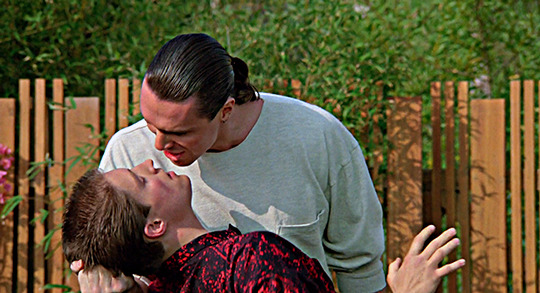
and this
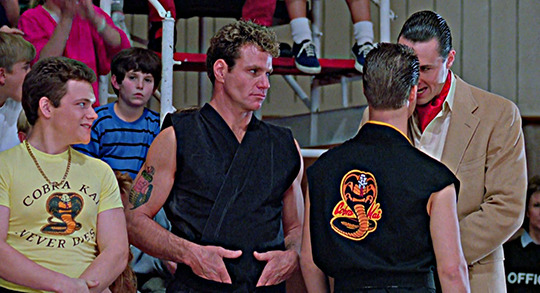
Granted, Terry has a personal space issue with like everyone, apparently, but still, grabbing his hair? It’s not even like Mike has long hair for him to grab in the first place. And I don’t think you have to practically spit in his mouth to pretend threaten him.💀
literally, why are they standing this way

just look at the way Daniel and Kreese look at him😭
It’s giving
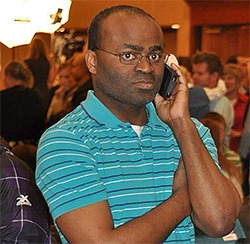
And then in s5, Terry burned down Mike’s store, and of course everyone links that to his jealousy over Daniel. But that store was Mike’s father-in-law’s store. So yeah it affected Mike, but it obviously affected his wife much worse lbr. And what did this lead to? Supposedly, Mike’s wife leaving him. So he basically ruined Mike’s marriage the same way he tried to do with Daniel and Amanda. 👀
And okay idc if this is a reach but Mike being on something even "stronger" than alcohol...While Terry confirmed he was on crack back in the 80s.......Remember Daniel's "your ponytailed pimp" line.
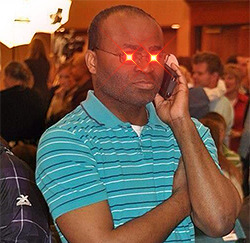
And when he mocks Johnny for being dumb and "attacking me on my own turf" which technically was Mike’s idea, BUT earlier he also said, "Uh oh, fellas, I don’t think this is gonna turn out like you thought it would." only AFTER Mike got knocked out. Because even though they would have still been outnumbered with Mike in the fight, he knew none of his little foot fist ninjas were going to stand a chance against Mike. So Mike is taken out of the fight and just like tossed in another room, which puts him conveniently out of harm's way. It’s not like he was locked in or whatever so I don’t think the major concern here was keeping him from waking up and rejoining the fight.
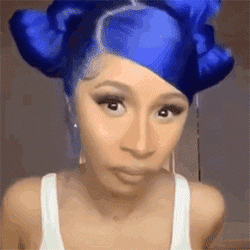
And btw, Mike’s plan was what ended up saving the day, cause Terry arrived too late to the dojo and was in no condition to fight Daniel. King Shit.💅
Then Terry leaves Chozen for dead in his pool and tells the senseis to pull an mk fatality on Johnny. And Mike? Just let him sleep it off. <33
like hello??

Terry knew what he was doing. He wanted Mike back by his side on a pretty leash and Daniel on his knees for him.

17 notes
·
View notes
Text

Haya the Hedgehog
back in August 2022, i made some dinky designs; Sonic Badniks in the style of Mario enemies. after a while in September, i then got to drawing Sonic, and then the rest occurred.
because further posts will show these designs, i'm somewhat forced to introduce it as a separate post for easier linking for context.
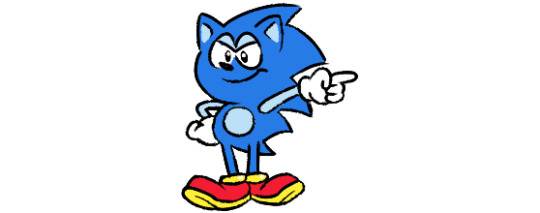
before that, however, i was doodling this Mario-centric Mario/Sonic crossover idea that would act as this introduction to Sonic’s world and his characters to Mario players. basically, some alternate Sonic Forces where Eggman not only captured Sonic, but his friends too, leaving nobody else to come save the world.
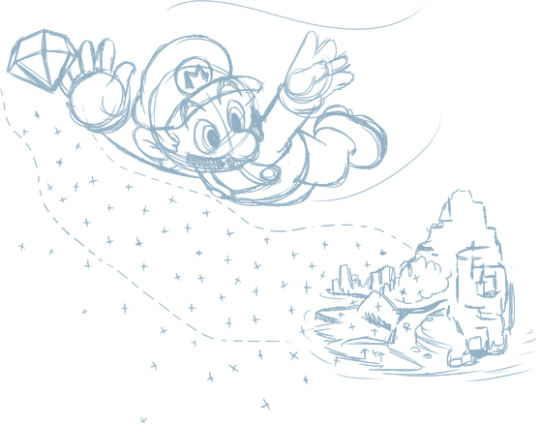
so Mario would arrive in this rainbow ring and explore the world to save everyone. big hogablah
because of that, i was thinking how Mario would arrive there, if this version of Sonic's world is part of Mario's universe, if it follows the same lore rules... same... design rules... and that's how i got this child to take care of.
so now we have the Haya Dimension; a dimension in Mario’s universe (think like how Super Paper Mario handled it) where it also has to play along with the rules of Mario. therefore, i put myself within these four rules:
Follow the basic plot beats, not the nitty gritty. The corporate suits above only care about the former, after all.
Change whatever worldbuilding to fit in-line with Mario’s.
Sonic’s name is Haya.
Lower some stakes so as not to cause Mario to travel there and get involved. (Sonic 06 was on my mind when i wrote this)
the Haya Dimension has to be completely outside of Mario’s point of view. nobody there must know the mystery about this dimension. nobody!! not even… Birdo
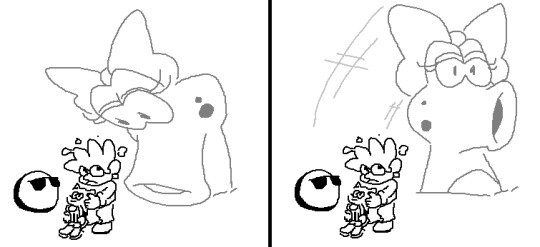
Differences
yea of course this has to happen. okay uhh i’ll be aping off of my DeviantArt post noting down some differences. note that some of these aren't entirely Mario-related lol
During the Classic Era, Eggman hired a bunch of organic creatures; the badniks are living creatures. Higher-ranking in the Eggman Empire being robots.
Starting in Dreamcast Era, all of Eggman's troops were replaced by robots. This explains E-123 Omega remaining a robot; a modified Topman Tribe husk
Ending in Meta Era (Colors onward), Eggman's troops are both a mix between organic and robotic troops. High-ranking remain robots.
There's no Classic/Modern distinction. Haya Generations looks really different.
There's no physical "future period" in Mario, so Silver is left as a present-day future teller, always relying on the Stars telling him the future.
That there's no "future period" to travel to requires Haya 06 to be rewritten entirely.
The Sol Dimension is a Special World equivalent of Haya's Dimension. Onyx Island comes from the Sol Dimension. Eggman Nega is our Bowser (blue) equivalent.
Cream and Vanilla likely lived on the Moon before becoming homeless after the events of Adventure 2. After that, they moved to Earth.
Sage is designed as a fairy
Honey is a Drag Queen.
Kitsunami's water pack is designed after inter-dimensionally observing E. Gadd's F.L.U.D.D. tech.
Eggman's Goal Plate is a Flag Plate. Spin it all the way down as fast as you can for bonus points.
The magical gems have eyes and special hairstyles. I'm waiting till Sonic Superstars showcases each Emerald's special power before assigning a symbolic hairstyle to them.
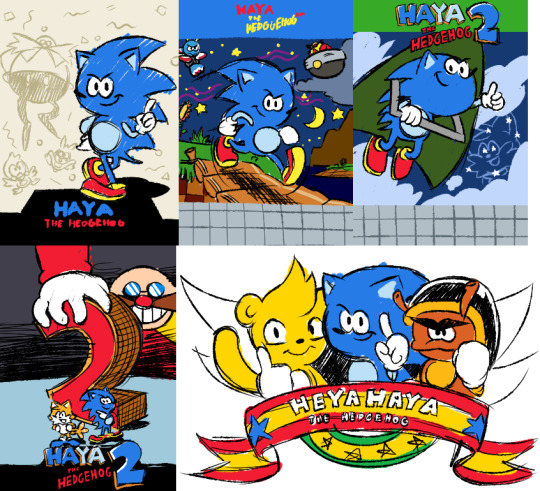
it's basically become my personal playground to test my might, my designs, and my writing.
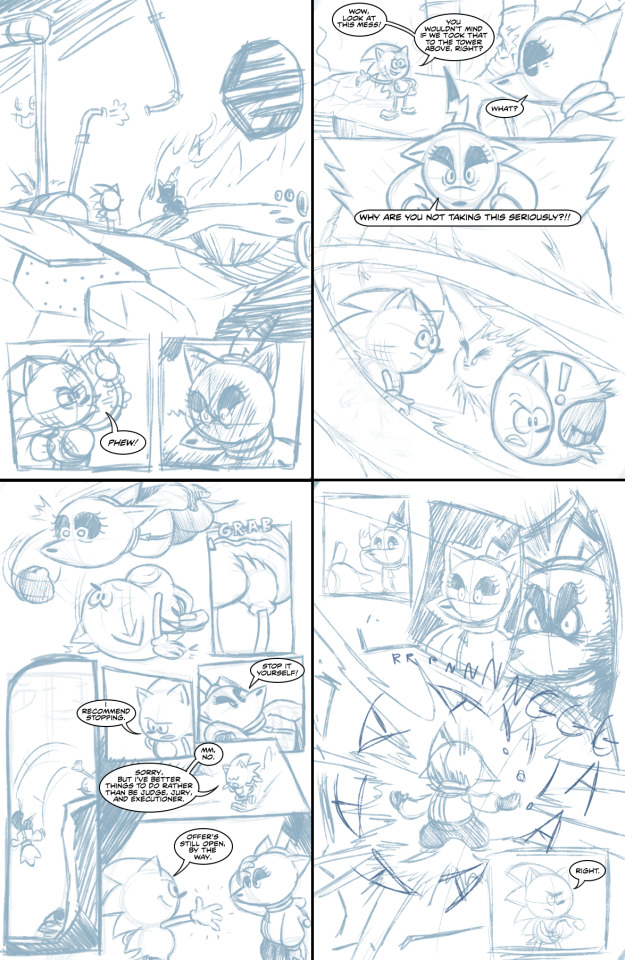
i understand i've yet to fully understand these characters, but i've also done my best to try and write bios for the characters present.
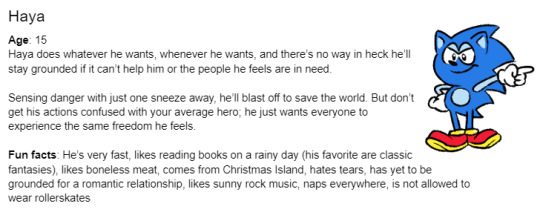
Haya was originally designed as if he were a Mario enemy. he serves as the groundwork design for everyone else. as a Mario enemy, i specifically brought attention to his shoes being a colorful red-yellow.
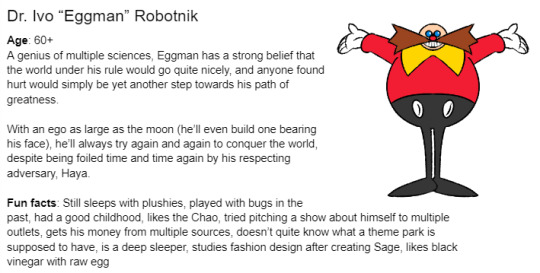
Eggman went through a ton of designs. they all failed. there's no way to change him. he's already great. his only difference has him with a round nose instead of a triangular one.
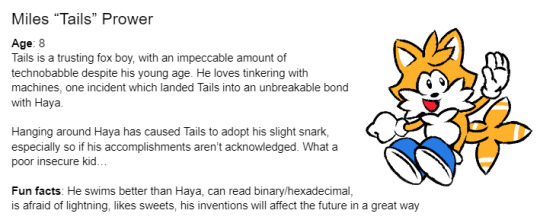
his tails were designed after propellers, yet still mutated to still make his bully backstory make sense. the stripes on his tails are designed after propeller wings.
and that's all i wanna share right now. as Reupload Gonanza continues, more and more of these designs will start appearing, each with a slight justification from me behind each designs. be sure to check out the "#Haya Dimension" tag under the post.
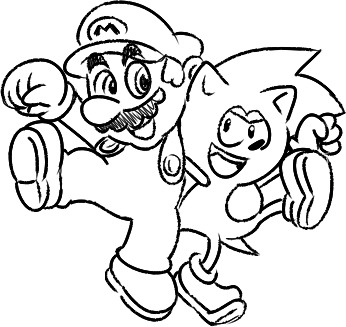
12 notes
·
View notes
Text
What the Tartan Tells Us
Or, Tales from the Tartan
(I wanted both titles!)
Updated 10 Nov 2023
I've been reading up a bit about tartan today to what it can tell us, and it seems its not too hard to do. The clues are more in the colours, and the overall pattern, there aren't any particularly rigid rules that need to be stuck to.
For the colour analysis, I'll be referring to my recent colour meta All the Colours of the GO Rainbow for interpretation. I need to tweak the interpretation for red on it, though, based on what I'm seeing here, and some other information I just got. That's OK, red and yellow are the two hardest colours to pin down, they are quite complex in their meaning and perhaps not what you expected them to be, and I expect that it will be a meta that evolves a bit over time anyway.
So for a warm up, let's start with the tartan blanket Aziraphale provides to cover the naked Gabriel on the first day he arrives at the book shop.
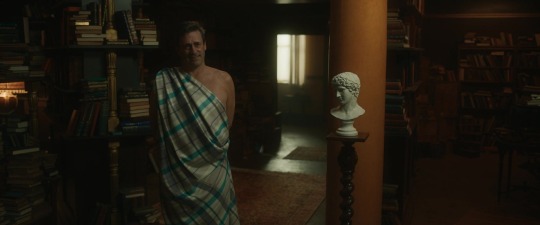
Lets lists the colours we can see:
White - for his base angelic nature that is showing since he misplaced his memory.
Oystershell gray - for his high angelic ranking as Supreme Archangel Gabriel.
Teal* - Blue mixed with green, Heaven mixed Hell, Lawful mixed with Chaos; which is one of Aziraphale's signature colours.
Black - that hint of a mystery in play. What is being hidden?
Dark Gray - the thick cross stripes, which are interesting. "Shades of gray" are something we associate with Aziraphale and Crowley. That's the world they walk in on Earth together, where their two sides blend together. Another hint that Gabriel was starting to see something else than the one-sided thinking of Heaven?
[*I've bounced around a bit on this colour while writing this, but I'm going back to my original thoughts on it. It's not Heaven blue, its tainted with green, and its the same colour Saraqael and Muriel wear (see below) so its something else.]
Next, let's look at Aziraphale's own tartan. We mainly see it in his bow tie, but it also appears on the bike rack he miracles onto the Bentley when they give Anathema a lift back to Jasmine Cottage in S1E2. I'm going to use the examples from this older post by bluebandedagate back in 2019 called A Discourse on Tartan, as they make it quite clear, and when I looked at it closely again after doing my colour meta I actually gasped. Because it tells us there is very little of Heaven left in Aziraphale, despite what he openly says, and one other very revealing fact.
Here is the tartan swatch. It's called "Heaven's Dress Tartan," despite there being next to no Heaven in it.

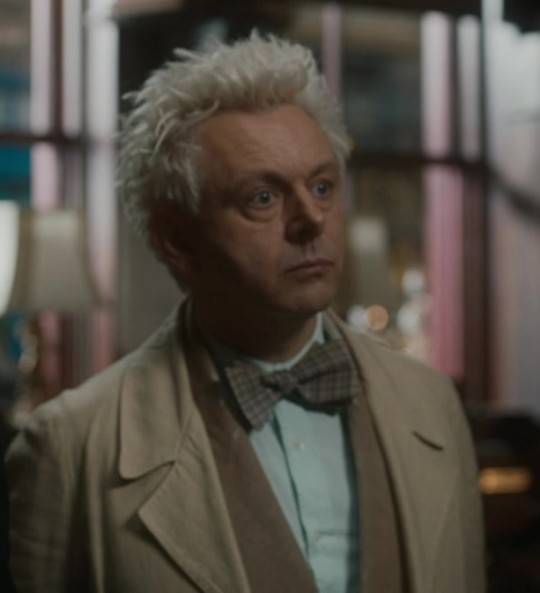
For a start, there is no white base, which we night expect with an angel. Its all been removed.
We have a beige base instead, which is one of the working angel colours, probably there as part of his Earthly duties.
There are some wider dark gray stripes. My interpretation here is this is the work of Crowley, who has made him question the morality of Heaven over time - the shades of gray.
Then we get the thin black stripes - the mystery of his unpredictable nature. You never quite know what he's going to do next... Plus the constant effort to hide what he is doing with Crowley.
And finally the red. Red is never a colour associated directly to angels in the present day, so it can only mean one thing - a declaration of his bond to the one who does wear that particular shade of red - Crowley.
Red is not necessarily a demonic colour per se, its more a colour of devoted passion. Shax also wears red, usually a darker red, and she is devoted to climbing the ranks of power in Hell with a passion. And the Red Team in the paintball battle at Tadfield Manor represented the faction devoted to management and following the rules.
The other noticeable thing about Aziraphale's tartan is the tightness and intensity of the pattern. The stripes are quite thin and they repeat often.

Saraqael's tartan is:
Purple, for royalty. they rank high, somehow, or they're aligned with Gabriel's office.
Oyster-shell gray, for the Archangels.
A pinstripe of primary blue, for Heaven.
White for angels
A wide stripe of dark gray (on the collar.)
Wow. That's some heavy hitting in combinations of colours there. We've recognized them as one of the "dark horses" in the series, and their Tactical Turtleneck backs up the idea that they are now involved with surveillance and spy work in Heaven (eh, they were certainly watching and spying on Crowley and Muriel during their little jaunt in Heaven in S2E6. And I sooo wish I could get a good look at their ring, but there just isn't high enough resolution to do so.)
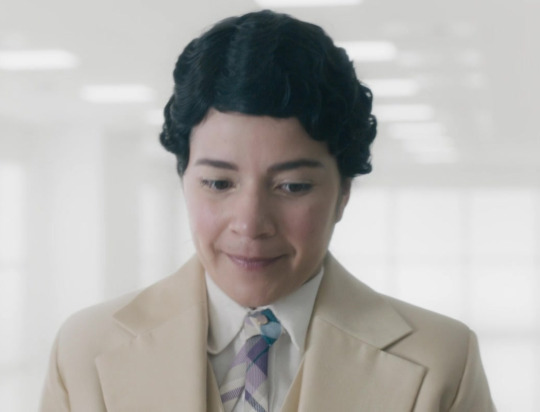
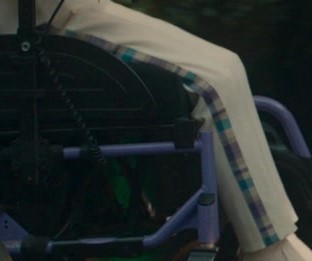
Muriel's tartan is very similar to Saraqael's but has a pattern with a teal theme in it as well. It's a bit hard to tell the shade of blue-green here, but a closer look at Saraqael's trouser leg reveals all the colours in their tartan displayed in a strip down the outside seam. Purple and silver-gray dominate, but the teal-blue pops out as well. It looks very similar to the shade of teal in Jimbriel's blanket above. Yep, a dark horse, indeed. I wouldn't trust Saraqael, if I were you.
There is some question as to whether Muriel reports directly to Saraqael, but I am wondering if this marks them as one Saraqael has to keep their eyes on as well - because of something that happened in the past. How does one become a lowly 37th ranked scrivener? I mean, c'mon, doesn't that just sound...ridiculous? What did they do to get demoted so far down? And how many others were demoted before them? Questions for another day, perhaps.

Edit: I missed this example in my original post - Jimbriel wearing a dressing gown with a similar tartan to Saraqael and Muriel. This occurs right at the beginning of S2E3, if you are looking for it. It's all the same colours - royal purple, archangel silver-gray, white but also a cross stripe of black and a wider cross stripe of dark gray. He only wears it in this one upstairs shot. There is some metaphorical context here - Jim is looking out and down over the "Outside" as everyone moves about on Whickber street below, much like an angel looking down from Heaven at humans moving about on Earth (yes, you should think about the upper level of the bookshop as corresponding to Heaven...it is "upstairs" after all.)

The other tartan I saw was on the kilts of the angelic soldiers behind the quartermaster in S1E5, when Aziraphale has discorporated in the portal and gone up to Heaven. The tartan there is just in two to three different shade of working-angel beige and off-white, in big wide stripes. Fairly ordinary, run-of-mill stuff. Rank and file, if you will.
I couldn't get a good look at the colours of the tartan on the thermos of holy water Aziraphale gives Crowley in S1. When you enlarge the images they go a bit blurry as they are not high-def enough. I can't tell if its green or gray stripes running vertically, and if the horizontal ones are black or red, or both. If so, that's an interesting colour choice for Aziraphale to give to Crowley, and it's certainly not the same pattern as his bow tie. I could understand if it was just a wider pattern of the beige-grey-black-red. If anyone can help out I'll update with a description and analysis.
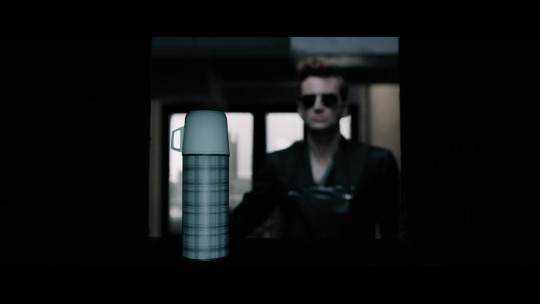

#good omens#good omens 2#aziraphale#crowley#good omens meta#good omens analysis#celestial tartan#tales of the tartan#color theory#color meta#muriel#saraqael#gabriel
46 notes
·
View notes
Text

OC Brain Rot Introductions
After making the first post with Thea and Abby, I realized that I didn't have an intro post introducing the character or to formally address what these kind of posts are going to be about (aside what I put in Thea and Abby's first post)
OC Brain Rot (based on this post here originally) are posts where I ramble off about my OCs and what they're up to currently outside of my writings and arts. In essence, these are brain dump posts. Sometimes they might be a couple of sentences and half-formed ideas, others might go into meta involving my ocs and whichever game they are a part of. Sometimes it might also include simple screaming, you just never know.
Brain rots will also NOT be spoiler-free! I'll usually note at the top of each post if there are going to be spoilers. Content and trigger warnings will also be noted in the beginning and in the tags where applicable.
OC Brain Rot is also open to questions towards and about the OCs themselves. They might even answer your questions themselves!
I've decided that, instead of having a separate tumblr blog (since I have like four of them at this current moment in time), I'll just make little posts about the ocs on main since I'm not especially active here as I'd like to be outside of queued posts and I have answered some questions in my OC's voices on this blog before (like this one from Houki giving her opinion on IkeSen's Masamune) and would like to get back into doing something like that.
Brain rots are also mostly going to involve my otome/dating sim OCs, but everyone is also welcome to ask about my original ocs and, if you're really curious, about older ocs that I've made for other fandoms outside of the otome/dating sim ones.
Below the cut, I've also put short intros for each of my ocs as quick reference for future brain rot posts. Longer, more detailed profiles will be made at a later date, but these will serve as little reminders for where this oc is coming from when I make future oc brain rot posts.
For other posts involving my OCs, here's my writing masterlist for them
Thanks for stopping by lovelies and hope to hear from you again soon!
--------
Houki of Jiyel, "Houki"
Preferred Pronouns: She/Her
Game: Ikemen Sengoku
Suitor: Mitsunari Ishida
Age: Early 20s
Physical Description: Short stature and chubby, large, bright green eyes, long straight black hair (that looks blue in certain lights), light to medium skin, wears round glasses
Personality: Quiet, Introverted, Observant
Brief History: A transplant MC from a different game, Houki was a noble lady sent on a diplomatic mission to strengthen ties between her home nation and six other kingdoms, mainly through the means of political marriage and alliances. Her plans were interrupted when she arrived in Sengoku era Japan and is now trying to find a way back to her home world to complete her original goal.
Misc. Fact: She loves reading more than anything in the world. It is her favorite pastime and is more often than not found reading some tome at almost any point in the day.
------
Ophelia of Revaire, "Ophelia"
Preferred Pronouns: She/Her
Game: Ikemen Sengoku
Suitor: Kennyo
Age: Late 20s
Physical Description: Pale skin and hair (chin length and straight, parted to her right, our left), medium height, thin and willowy, dark red eyes, chin mole towards the right side (our left) of her face
Personality: Calculating, calm, refined
Brief History: Another transplant MC from a different game (same game as Houki), she was on the same diplomatic mission as Houki, but for different reasons. Born into a poor noble family, Ophelia has spent most of her life trying to bring up her family's position, was even briefly married for the cause, but thanks to her previous husband's passing, she's needing to social climb again to keep her family afloat, thus joining in her country's call for this diplomatic mission, hoping to marry rich. Being transported to Sengoku era Japan was not on her agenda and she's definitely not happy about this new life turn.
Misc. Fact: She has eight younger siblings, six sisters and two brothers.
-----
Dorothea "Thea" Reid
Preferred Pronouns: She/Her
Game: Ikemen Vampire
Suitor: Theodorus van Gogh, Arthur Conan Doyle
Age: Early 20s
Physical Description: Fair skin with lots of freckles, esp on her face and shoulders, long reddish-brown hair that she keeps in a braid most of the time, large blue eyes, medium-tall-ish height (just shy of Theo's eye level)
Personality: Friendly, outgoing, stubborn
Brief History: A lover of history and fashion, Thea had combined her love of both and had just finished her degree to be a fashion historian, and thought to reward herself after finishing college by taking a trip to Paris! Who knew a trip to the Louvre would start her biggest adventure yet?
Misc. Fact: Always wearing something either historical or historically inspired, like long skirts and embroidered blouses.
------
Abigail "Abby" Clarke
Preferred Pronouns: She/Her
Game: Ikemen Vampire
Suitor: Vincent van Gogh
Age: Early 20s
Physical Description: Short-medium height, blonde bob/short hair that she grows longer to shoulder length as she ages, warm brown eyes, fair skin
Personality: Quiet, meek, curious
Brief History: Escaping from a bad situation, Abby finds herself in Paris, admiring the art and history that the city has to offer. Running into a mysterious gentleman that helps her escape some hooligans, she accidentally follows him through his magical time door and ends up in the 19th century! What's a girl to do now?
Misc. Fact: Her favorite hobbies are drawing and photography, though she wasn't really able to explore them as she liked in her previous life. She thrives under the tutelage of history's greats in Comte's mansion.
------
Madeline "Maddie" Fleming
Preferred Pronouns: She/Her
Game: Ikemen Revolution
Suitor: Harr Silver
Age: 30
Physical Description: Short and curvy, greenish grey short hair that's wavy, wine red eyes, light medium skin, ears pierced (once in each lobe, and two at the top of each ear, making a total of six piercings)
Personality: Outgoing, caring, fun
Brief History: Visiting her grandparents in London, Maddie had found herself in James Park, meeting with a nice, if absent-minded gentleman. She had tried to return his lost pocket watch to him, but she accidentally follows him back to Cradle, starting her journey to unlocking powers she previously didn't know she had and to bringing peace between the two warring armies fighting over the magical wonderland she had found herself in.
Misc. Fact: Her power manifests itself mostly in non-living items. When she was younger, she made fake flowers to give to people she knew, singing to them as she worked. Her flowers would then take on characteristics she was singing about (a la Sophie from Howl's Moving Castle book version). Her flowers could make you have more luck on a test or even give you the confidence to confess to your crush! But be careful if you piss her off as her negative vibes can transfer to her targeted item and turn it cursed!
------
Clara Laurent
Preferred Pronouns: She/Her
Game: Ikemen Prince
Suitor: Nokto Klein
Age: 27
Physical Description: Medium skin tone, wavy dark brown hair usually kept in a low bun, short to medium height, pink eyes
Personality: Serious, stubborn, kind
Brief History: A ward of Mr. Akatsuki, she was taken in by bookstore owner at a young age, growing up around books and a love of learning. During a festival, she met with a few of Rhodolite's princes, their interactions watched by Sariel, the prime minister, looking for candidates to be the next Belle, a person with a pure heart that chooses the next king of their country. She is chosen for this role, using her best judgement to make the right choice for her tiny kingdom, especially with the loom threat of war on their heels.
Misc. Fact: Her favorite book series is the Midnight Cinderella saga, telling the varying adventures of a commoner chosen to rule over the fictious kingdom of Wysteria. Her favorite in the series is Byron.
------
Miriam "Miri"
Preferred Pronouns: She/Her, They/Them
Game: Obey Me!
Suitor: Lucifer
Age: Early 20s in season 1, close to late-20s by season 4/nightbringer's timeline
Physical Description: Medium-dark skin tone, pink curly hair that gets to its longest by season 4 (which is mid back), purple to pink gradient eyes, short stature, her pact marks glow when she's actively using her pact bonds. Pact mark locations include: Chest over her heart (Lucifer), behind her right ear (Mammon), Left knee (Leviathan), Right forearm (Satan), Lower back (Asmo), Stomach above the navel (Beel), Neck right on her windpipe (Belphie). Post Season 2, she has Lucifer's Ring of Light on her left hand ring finger. Season 3 and beyond, she has her Sorcerer's Society Tattoo on the back of her right hand, along with a ring on her middle finger that signifies she's a sorcerer and a member of the Sorcerer's Society, given to her by Solomon.
Personality: Curious, kind, stubborn
Brief History: Arriving in Devildom as a little pink sheep, Miri works to find a way to turn herself back into a human, which leads her to being made an exchange student at RAD, a school-like organization run by the devildom prince Diavolo, who hopes to bring the three realms together into peaceful relations. While staying in devildom, she is taken in by a group of powerful demon brothers, former angels from the Celestial Realm fallen from grace. In order to turn herself back into a human, she needs their power and she makes pacts with each to gain their help and support. As her bonds grow stronger with the brothers, so too does her own power, coming to a realization that she is a sorcerer in later seasons, learning to control her powers and to use her powers for good and to help Diavolo's cause to bring the three realms to peace.
Misc. Fact: She loves sweets and hates spicy things. She has a healthy fear of Mammon's extra spicy ramen and refuses it every time it's offered to her. Even regular ramen makes her suspicious after having sampled Mammon's favorite once.
#krys talks#krys's adventures in fiction#krys's babies#oc brain rot#houki of jiyel#ophelia of revaire#dorothea reid (oc)#abigail clarke (oc)#madeline fleming (oc)#clara laurent (oc)#miriam (obey me oc)#jumped the gun with the first post before making any sort of formal introductions#whoops#but that is remedied now#hopefully#still need to make full intros for literally everyone#and reference sheets to go with the intros#like#Houki's updated version and Clara's intros are pretty much done aside from the visual reference sheets#Miri's is taking forever given the nature of Obey Me as it contains four main seasons plus two more (currently) with Nightbringer#I'll get there eventually
4 notes
·
View notes